
























































































































LEGA L AWARDS 2023 ARDS 3 New Venue and New Categories: THE OFFICIAL JOURNAL OF THE SURREY LAW SOCIETY | SPRING 2023 SurreyLawyer ■ The Persecution of Lawyers ■ The UK Property Market THE SLS LEGAL AWARDS 2023 Thursday 12th October


2 | SURREYLAWYER XXXXXXXXXXXX Don’t change what you do. Just make it easier to do. See how Clio makes legal practice management easier. Discover Clio today at clio.com/uk/surrey-lawyer or call +44-800-433-2546.
PUBLISHER Benham Publishing

Aintree Building, Aintree Way, Aintree Business Park, Liverpool L9 5AQ
Tel: 0151 236 4141
Fax: 0151 236 0440
Email: admin@benhampublishing.com
Web: www.benhampublishing.com
ACCOUNTS DIRECTOR
Joanne Casey
SALES DIRECTOR
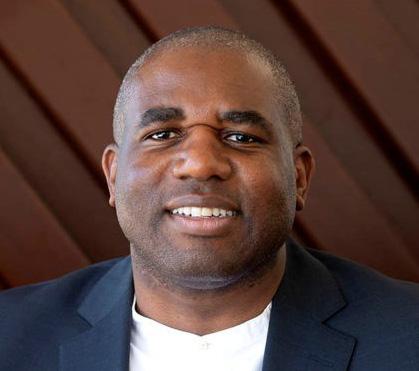

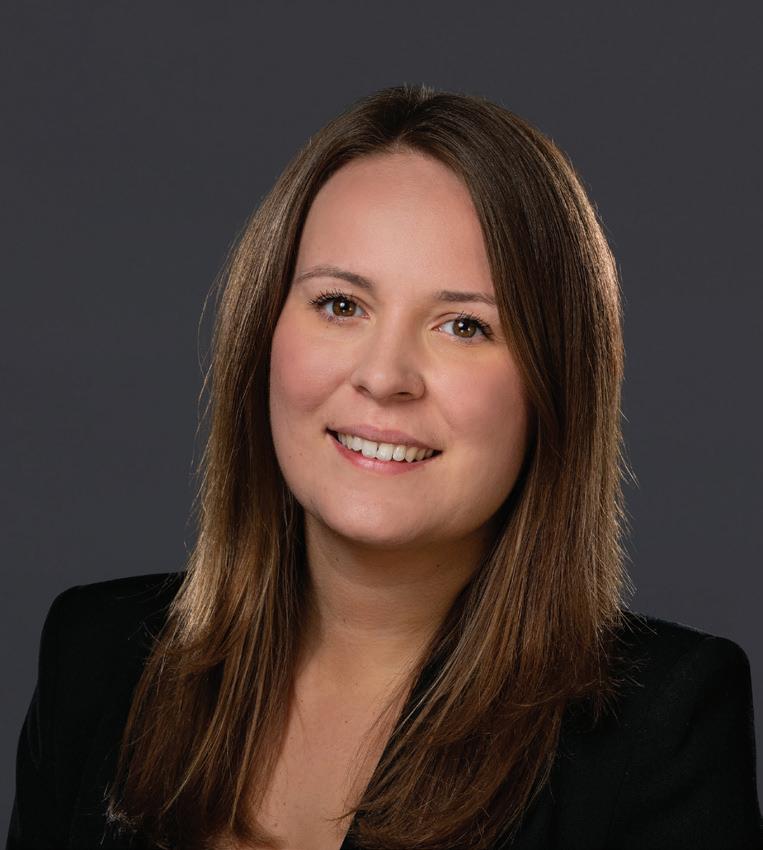
Karen Hall
STUDIO MANAGER
John Barry
MEDIA No.
1954
PUBLISHED
Spring 2023 © The Surrey Law Society Benham Publishing Ltd.
LEGAL NOTICE
© Benham Publishing.
None of the editorial or photographs may be reproduced without prior written permission from the publishers. Benham Publishing would like to point out that all editorial comment and articles are the responsibility of the originators and may or may not reflect the opinions of Benham Publishing. No responsibility can be accepted for any inaccuracies that may occur, correct at time of going to press. Benham Publishing cannot be held responsible for any inaccuracies in web or email links supplied to us.
DISCLAIMER
The Surrey Law Society welcomes all persons eligible for membership regardless of sex, race, religion, age or sexual orientation.
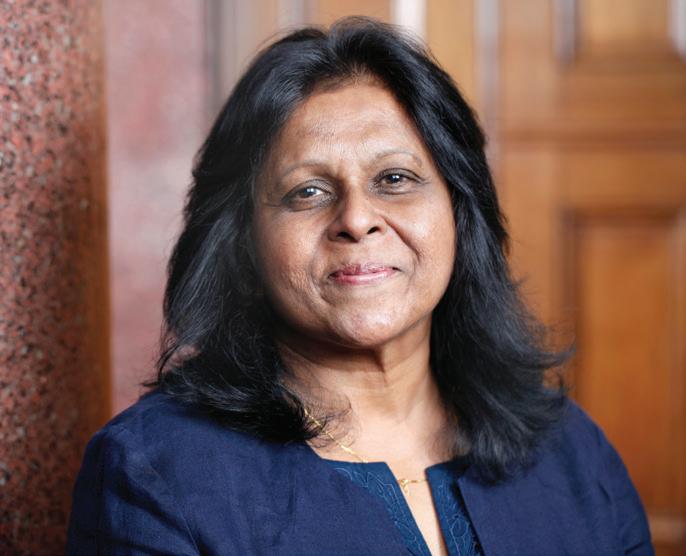
All views expressed in this publication are the views of the individual writers and not the society unless specifically stated to be otherwise. All statements as to the law are for discussion between members and should not be relied upon as an accurate statement of the law, are of a general nature and do not constitute advice in any particular case or circumstance.
Members of the public should not seek to rely on anything published in this magazine in court but seek qualified Legal Advice.
COVER INFORMATION
SLS Awards 2023
SURREYLAWYER | 3 @SurreyLawSoc @surreylawsociety https://www.linkedin.com/groups/8731473
Contents 05 05 President’s Jottings 07 CEO Report 08 News 10 Focus on EDI 12 Training & Events Programme 2023 14 SLS Legal Awards 2023 16 Council member's Report /Surrey Junior Lawyers Division 17 The UK Property Market - Is it doom and gloom? 18 The Persecution of Lawyers 21 Over half of Brits expect to inherit property in their lifetime 23 How firms can leverage technology to help beat the skills shortage 24 Lessons from the latest big fine in AML 26 How to Create Quality Content That Ranks 28 The Modern Art of Delegation 29 Climate change:
16th JUN 2023 (For JUL 2023) 28th SEPT 2023 (For OCT 2023) Advertising Anyone wishing to advertise in Surrey Lawyer please contact Catherine McCarthy before the copy deadline. 0151 236 4141 catherine@benhampublishing.com Editorial Anyone wishing to submit editorial for publication in The Surrey Lawyer please contact Helen Opie before the copy deadline. 0333 577 3830 helen.opie@surreylawsociety.org.uk Follow us on social media 18 16 10
Copy Deadlines
KEY OFFICERS
President
MADELEINE BERESFORD
TWM Solicitors LLP, 65 Woodbridge Road, Guildford, Surrey GU1 4RD
Tel: 01483 752742
Email: madeleine.beresford@twmsolicitors.com
Hon. Secretary
KIERAN BOWE
Russell-Cooke Solicitors, Bishops Palace
House, Kingston Bridge, Kingston upon Thames, Surrey, KT1 1QN
DX 31546 Kingston upon Thames
Tel: 020 8541 2041 Fax: 020 8541 2009
Email: kieran.bowe@russell-cooke.co.uk
Hon. Treasurer
CLAUDENE HOWELL
Owen White & Catlin LLP, 74 Church Road, Ashford, Middlesex TW15 2TP
T: 01784 254188
E: claudene.howell@owc.co.uk
COMMITTEE MEMBERS
NICK BALL
TWM Solicitors LLP, 65 Woodbridge Road, Guildford, Surrey GU1 4RD
Tel: 01483 752700
Email: Nick.Ball@twmsolicitors.com
CARINA BRITS
Palmers Solicitors, 89-91 Clarence Street, Kingston upon Thames, Surrey KT1 1QY
Tel: 020 8549 7444
Email: carina.brits@palmerssolicitors.co.uk
KAREN GRIMM
Stone Rowe Brewer LLP
72 High Street, Teddington, Middlesex, TW11 8JD
Tel: 020 8977 8621 k.grimm@srb.co.uk
MARALYN HUTCHINSON
Kagan Moss & Co, 22 The Causeway, Teddington TW11 0HF
Tel: 020 8977 6633 Fax: 020 8977 0183
Email: maralyn.hutchinson@kaganmoss.co.uk
DEV JUMMOODOO
Rosewood Solicitors, Export House, 5 Henry Plaza, Victoria Way, Woking
Surrey GU21 6QX
Tel: 01483 901414
Email: dev.jummoodoo@rosewood-solicitors.com
DAWN LAWSON
Nichols Marcy Dawson LLP, Portman House, Colby Rd, Walton-on-Thames
KT12 2RN
Tel: 01932 219500.
Email: d.lawson@nmd-law.com
EMMA PATEL
sewood Solicitors, Export House, 5 Henry Plaza, Victoria Way, Woking Surrey
GU21 6QX
Tel: 0Tel: 01483 901414
Email: emma.patel@rosewood-solicitors.com
RACHEL PHILIP
S. Abraham Solicitors, 290A Ewell Road, Surbiton, Surrey KT6 7AQ
Tel: 020 8390 0044
Email: conveyancing@sabrahamsolicitors.co.uk
JAMES SCOZZI
Elite Law Solicitors, 1 Fetter Lane, London EC4A 1BR
DX: 14 London Chancery Lane
Tel: 020 3440 5506 Fax: 01923 219416
Email: jscozzi@elitelawsolicitors.co.uk
KIM WINTLE
Blackfords LLP, Cleary Court, 169 Church Street East, Woking GU21 6HJ
Tel: 03330 150150
Email: kim.wintle@blackfords.com
LAW SOCIETY COUNCIL MEMBERS
SUSHILA ABRAHAM
S Abraham Solicitors 290A Ewell Road, Surbiton KT6 7AQ
Tel: 020 8390 0044
Email: office@sabrahamsolicitors.co.uk
ALASTAIR LOGAN
Pound House, Skiff Lane, Wisborough Green, West Sussex RH14 DAG
Email: alastairdwlogan@btinternet.com
Chief Executive & Magazine Editor
HELEN OPIE
Surrey Law Society, c/o Russell-Cooke Solicitors, Bishop’s Palace House, Kingston Bridge, Kingston-upon-Thames, KT1 1QN Web: www.surreylawsociety.org.uk
Tel: 0333 577 3830
Email: helen.opie@surreylawsociety.org.uk
SUB-COMMITTEES
CONVEYANCING & LAND LAW
Rachel Philip
Carina Brits
Maralyn Hutchinson
Ema Jones
Martin Whitehorn
EQUALITY, DIVERSITY & INCLUSION
Emma Patel
Victoria Clarke
Amber Howton
Alastair Logan
Linda Lusingu
Amber Matheson
Maria Mingoia
James Scozzi
FINANCE
Claudene Howell
Nick Ball
Maddie Beresford
Kieran Bowe
Helen Opie
PRIVATE CLIENT
Kieran Bowe
Maddie Beresford
Jess Buttaci
QUO VADIS
Claudene Howell
Nick Ball
Maddie Beresford
Kieran Bowe
James Scozzi
Helen Opie
SOCIAL
Madeleine Beresford
Claudene Howell
Daphne Robertson
Gerard Sanders
Helen Opie
Kim Wintle
SURREY JUNIOR LAWYERS DIVISION
Kim Wintle (Chair)
Martin Whitehorn (Vice Chair)
Katrina Burrows
Ellie Duke
James Fry
Mona Gholami
Seema Gill
Sapphira Gold
Bisma Hussain
Tabitha Lee
Amber Matheson
Daniella Mcleod
Alex Milson
Emma Smart
Bethany Walker
Daisy Welland
Email: surreyjuniorlawyersdivision@gmail.com
LinkedIn: https://www.linkedin.com/company/ young-surrey-lawyers
Instagram: jld_surrey
Twitter: @YSL_Live / @SurreyJLD
4 | SURREYLAWYER OFFICERS
This issue is to be my last before I am due to go on maternity leave at the end of May, so as I reflect on the last year, I’d particularly like to thank our brilliant CEO Helen Opie for everything she does for Surrey Law Society. Not every local law society has a Helen, and I feel very lucky that we do.
My term started by attending the Kent Legal Awards, hosted by Kent’s president Nick Fairweather. I am so pleased to see how Surrey’s relationship with other local law societies is progressing, and how we have been able to learn from each other. One of my objectives for my term was to establish a mentoring scheme, which Kent has already made a success of, so I really valued Nick’s guidance and support in creating Surrey’s version of this, which is due to launch in April.
Surrey’s own social calendar also had a brilliant year, with the return of the Daytona ‘Past President’s Championship Cup’ (a date for your diaries for this year’s Championship – 15th June 2023), and the Awards which were again a great success, hosted by Clive Anderson. We are looking ahead to the return of these events again this year, this time with a brand new location for the Awards.
I felt very honoured to have been in post over the centenary of Women in Law, and to have attended the Law Society’s celebration in Chancery Lane, on behalf of our members. It really is such a significant milestone, and it was very poignant to see how far the profession has come.
I recently had the opportunity to present the award for ‘highest average score across all modules of the GDL’ at the University of Law in Guildford, to Rachel Saffret. I did the Graduate Diploma in Law myself and I know there is a significant amount of work involved, so to achieve this alongside working was a fantastic achievement for Rachel.
We have also just hosted the second ‘John Perry Memorial Dinner’ which was introduced to the programme in 2022 to honour the enormous contribution to Surrey Law Society made by Past President John Perry. John was a much loved member of Surrey Law Society and touched a great many people’s lives. He was a firm believer in enjoying life and bringing people together – both present and past members, and it was great to catch up with some familiar faces again as well as getting to know some new members and sponsors.
President’s Jottings
SPRING 2023
I am so pleased to have had the opportunity to support the Samson Centre for Multiple Sclerosis as the charity for my term, a charity which is very close to me. Thank you all for your extremely generous donations, meaning we have raised more than ever before. I see first-hand the impact that the Samson Centre has, not only for people living with Multiple Sclerosis but also the effects of the oxygen therapy on people living with other conditions. I know the Samson Centre is immensely grateful for the support.
We’re delighted that the Surrey Law Society Committee has gained four new members in the past few months – Dawn Lawson (Nichols Marcy Dawson), Emma Patel (Rosewoods), Dev Jumoodoo (Rosewoods) and Kim Wintle (Blackfords). Surrey Law Society is heavily reliant on Committee Members and Sub-Committees, and to have more hands-on deck has been, and is going to be, a great thing.

Looking forward, there are great plans for the Equality and Diversity Sub-Committee. We have been discussing how to encourage more diversity in our industry, and the subcommittee will be attending local secondary schools to speak to students who may have discounted a career in law for whatever reason, and hopefully challenge any misconceptions.
I’m excited to see what is next for Surrey Law Society – I’ll be watching from the sidelines for now and hope to see you on the other side! �
SURREYLAWYER | 5 INTRODUCTION
Madeleine Beresford President
Madeleine Beresford
Selling with skill, speed & efficiency

Thousands of lots sold over the last 30 years
An in-person, no obligation appraisal by our expert team
The best possible price achieved on the day
Contracts exchanged on the day of the auction
Completion in as little as 20 business days
Transparent process for buyers and sellers alike





6 | SURREYLAWYER ADVERTISEMENT FEATURE
The Leading Independent Regional Land & Property Auctioneers Scan the QR code to start selling your land or property with us Scan the QR code to discover land and property for sale cliveemson.co.uk 0345 8500333
National coverage, local knowledge
CEO Report
SPRING 2023
It’s lovely to be writing my report for this issue with warmer weather around the corner, the clocks have just moved forward, the daffodils are out and yesterday there was a hint of sunshine, albeit only briefly.
The start of Spring means renewal time for the Surrey Law Society, and you have hopefully by now received your renewal notice from the office. I would like to express my thanks to all those who have already processed their subscription for 2023/24 and ask anyone who does not believe they have received their notice, or who has amendments to make to their subscription, to contact the SLS office as soon as possible. As you are hopefully aware, your annual membership of the Society entitles you to a large number of benefits, including but not exclusively:
• Eligibility to enter the SLS Legal Awards
• Training discounts and offers including 50% of the cost of our inperson and online courses.
• Free attendance at all the SLS webinars
• Unlimited opportunities to post vacancies on our Job Noticeboard
• Exclusive invitations to our Social Events
• Access to the Law Firm Marketing Club
• The chance to feature editorial in the the quarterly Surrey Lawyer Magazine
You can view full information on all the other benefits at our website, www.surreylawsociety.org.uk. You have hopefully by now seen the new website, which has been completely revamped to make for a much more streamlined user experience and sleeker design. On the website, you can find all our latest news, a full list of our training and events, a back catalogue of Surrey Lawyer issues, a list of members’ job vacancies and information on all our patrons.
On the subject of patrons, I want to extend my sincere thanks to our partners for this year, who are:
• Evelyn Partners (www.evelyn.com)
• Landmark Information Group (www.landmark.co.uk)
• Southey & Co (www.southeyandco.co.uk)
• Tower Street Finance (www.towerstreetfinance.co.uk)
• Finders International (www.findersinternational.co.uk)
• Pro Drive IT (https://www.prodriveit.co.uk/)
• Conscious Solutions (www.conscious.co.uk)
• LawSure Insurance (www.lawsureinsurance.co.uk)
• Teal Compliance (www.tealcompliance.com)
It really is a great pleasure to work alongside such a fantastic group of firms, each of whom offer exceptional services to the industry at the highest standards. If you haven’t done so already, I really would encourage you to visit their websites or reach out to them at one of our training sessions or events, to see how they might be able to assist you. In particular, I would like to give a warm welcome to our new patrons for 2023, Southey & Co and Teal Compliance.
Southey & Co are RICS Chartered Surveyors and Property Consultants specialising in working with law firms; they are dedicated property consultants, who will minimise the time you need to spend on nonlegal aspects of estate administration whilst providing you with the documentation and transparency required to meet your compliance obligations. Both Barry Mattock, Southey & Co’s Group CEO and Michael
Edwards, Group MD, attended our recent John Perry Memorial Dinner and I would encourage members at any future events to have a chat with them to fully understand the incredible service that they can provide to assist you.
Teal Compliance are a team of experts in compliance with extensive experience in the legal industry. Their services include conducting comprehensive audits to assess your firm’s compliance with relevant laws and regulations. They also draft and review policies and procedures to ensure your firm is up-to-date with the latest legal requirements. Additionally, they offer customised training courses to ensure that your staff is knowledgeable and up-to-date on key compliance topics. Teal was founded by Amy Bell, author of ‘Solicitors and Money Laundering and Compliance That Works’ and Chair of the Law Society’s Money Laundering Task Force, and we’re very fortunate that Amy has agreed to run some compliance sessions for Society members later in the year.
In other news, the Society has held a range of training sessions since the start of the year, and it was lovely to see so many of you attend these. We’ve run webinars on ‘One Couple, One Lawyer’, ‘How to Support and Assist Vulnerable Clients’ and ‘Delegation Skills for Lawyers’, alongside online courses on ‘SDLT & CGT – The Latest Updates for Conveyancers’ and ‘Understanding Surrogacy, Child Abduction and Adoption’. We also held our first in person course of the year to a full house of members, a ‘Will Drafting Masterclass’ by the excellent Professor Lesley King.
Last week, we kicked off our social events with the 2nd John Perry Memorial Dinner, which was a fantastic evening for members past and present and which you can read more about later in this issue. Our next event is the highly popular, Past President’s Championship Cup, which takes place at Daytona Sandown on Thursday 15th June. If you haven’t attended before and fancy taking a part in this hotly contested go-karting competition, do book your space early, as last year we were fully booked!
And lastly, we have our 5th SLS Legal Awards taking place later in the year and there is some exciting news about that overleaf. Nominations are open and we’d encourage you to submit your entries as soon as possible, as this year’s event is sure to be bigger and better than ever before!
Helen Opie Chief Executive & Magazine Editor

T. 0333 5773830
E. helen.opie@surreylawsociety.org.uk
@SurreyLawSoc
@surreylawsociety
Helen Opie (Chief Executive at Surrey Law Society)
Surrey Law Society
SURREYLAWYER | 7
INTRODUCTION
Helen Opie
New Home for RussellCooke In Kingston
Law firm Russell-Cooke has completed the relocation of its team in Kingston-Upon-Thames to Riverview House, a modern self-contained office building on the banks of the river.

The move is part of the firm’s long-term commitment to its Surrey clients and delivers the accommodation and flexibility to support the ongoing growth of its Kingston team.
The new premises is directly adjacent to Kingston Bridge on the bank of the Thames and provides over 9,000 square feet of premium office space including areas for hosting clients as well as industry and community events.
Russell-Cooke established its Kingston-upon-Thames office in 1985 and since then has become a leading legal services provider for local residents and the surrounding communities in wider Surrey.
The Kingston team’s expertise ranges across key practice areas including private client, family law, children and education law, residential conveyancing and real estate. It’s also an access point for clients to the wider legal services provided by the firm, from corporate and commercial to charity law.
The Kingston office officially opened on 30th January and is home to approximately 50 members of staff, including 9 partners. The firm is a proud champion of arts and culture in Kingston including as principal sponsor of the Cobham Rugby Club, supporting the Rose Theatre since its inception and many other community events and causes. It is also an active member of the Kingston Chamber of Commerce and the Surrey Law Society.
Local lawyers set to make a splash in channel swim for spinal injury charity
An all-female team of six lawyers from South East based Moore Barlow are set to swim the English Channel this summer to raise vital funds for spinal injury charity, Aspire.
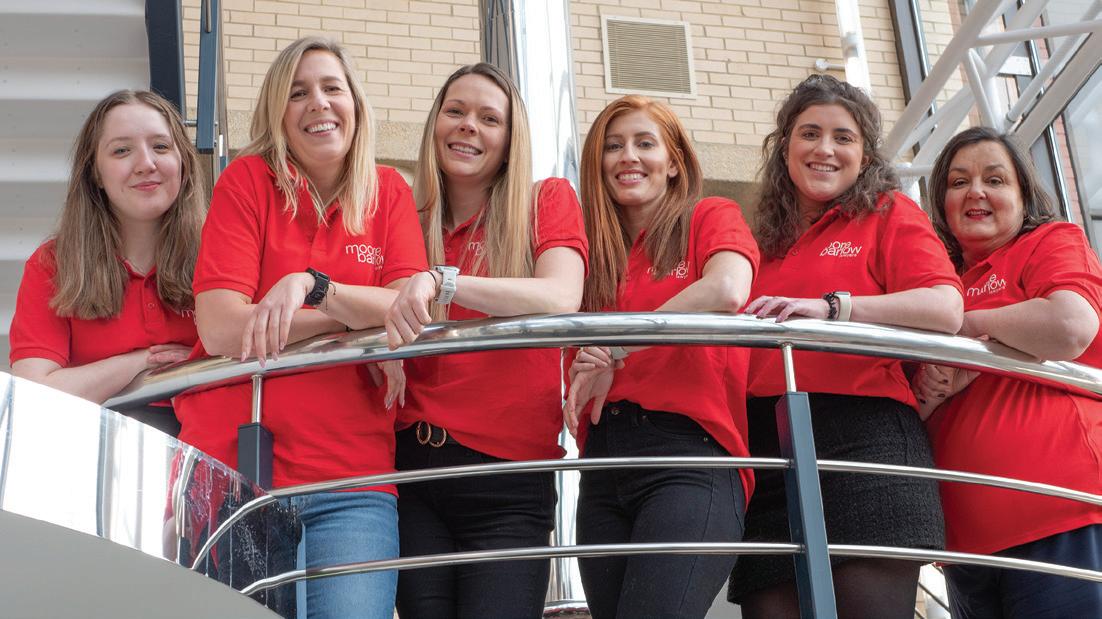
Louise Campbell, Fiona Hampton, Clair Philips, Danielle Cranstone, Maxine Winfred and Emma Williams will form the six-member relay team swimming from Dover to France in July.
In the relay format, each lawyer will swim on a rota of one-hour intervals along the 22-mile challenge.
The lawyers have recently completed medical and physical assessments with the Channel Swimming and Piloting Federation (CSPF) and are currently training ahead of the qualifying sessions in June.
Together, the team have set themselves a target of fundraising more than £10,500 for the charity.
Aspire is a national charity that provides practical help to people who have been paralysed by spinal cord injury. Spinal cord injuries result in the loss of muscle and sensory control and a large majority will become full time wheelchair users for the rest of their lives.
The new address for Russell-Cooke LLP in Kingston: Riverview House, 20 Old Bridge Street, Kingston, KT1 4BU
John Gould, Senior Partner at Russell-Cooke, commented: "Although we are only moving the length of Kingston Bridge, the new location will make us even more accessible to clients in North Surrey who want the services of a large London firm. It represents a real step forward.
“Our Kingston team has earned an unmatched reputation for providing first class legal services to individuals, families and their businesses in Surrey and beyond. Our new offices are a fitting reflection of this. The upgraded premises give us a superb base from which to continue delivering for our clients into the future and provide a high quality, collaborative workplace and environment for our people, with the modern, versatile space providing the flexibility to support our agile working approach and future growth.
“We look forward to welcoming our team, clients and friends in the community to Riverview House.” ■
“All six of us are confident amateur swimmers, but we are aware of the difficulties involved with swimming across the Channel, especially with its unpredictable weather conditions. We’re currently training in our individual local pools before we head out into open water sessions together in the spring.
“Aspire is an incredible charity and offers practical support to tens of thousands of people living with a spinal cord injury in the UK and we’re proud to be supporting them with this challenge. Moore Barlow along with Aspire, formed Aspire Law - the only UK law firm to specialise solely in representing and supporting people with spinal cord injury claims. To help further by raising funds to help others will be great motivation for us when we are in the middle of the channel battling the elements.”
For more information on the channel swim and to donate visit: https://www.justgiving.com/team/aspireeagles ■
8 | SURREYLAWYER NEWS
Louise Campbell, partner in the commercial property team at Moore Barlow, said: “Swimming across the English Channel is seen as the Mount Everest of all swims, and we are all looking forward to the challenge that lies ahead of us this summer.”
Moore Barlow Channel Relay Team
Sustainability at the heart of Stevens & Bolton's new headquarters

Stevens & Bolton has recently announced the opening of its newly refurbished headquarters in Guildford. The renovation has sustainability and employee and client experience at its heart and is on track to achieve RICS SKA silver environmental assessment and Fitwel ratings.

The firm recently announced its 12th consecutive year of growth, during which it has made five lateral partner hires, 26 new associate appointments, two partner promotions and 19 managing associate and senior associate promotions.
The refurbishment is underpinned by Stevens & Bolton’s commitment to provide the best possible physical environment for employees.
The firm worked in partnership with interior design and build experts, Denton, and sustainability consultancy, Verte, to ensure that minimising short and long-term environmental impact was at the heart of the new design. The RICS-certified SKA rating covers eight sustainability categories including energy and CO2 emissions, waste, water, pollution, transport, materials, project delivery and wellbeing, which have filtered into every aspect of the design process. 99% of waste from the old site was recycled and all new fixtures and furnishings were reviewed to ensure the firm would achieve a SKA silver certificate. With LED lighting throughout, an efficient new heating and cooling system
and over 900 plants filling the space, the whole building is optimised for energy efficiency, with a focus on reducing the firm’s carbon footprint.
The new office also caters to the demands of the modern workplace with a new client suite, state-of-the-art hybrid working technology and collaborative working spaces fostering an agile and supportive working environment. On track to achieve Fitwel health and wellbeing ratings for the offices, the refurb considers all aspects of the client and employee experience including transport routes, catering facilities and a dedicated wellness space for time out, religious practice, breastfeeding or pastoral support.
Commenting on the refurbishment, James Waddell, Managing Partner at Stevens & Bolton LLP, said:
“The transformation of Wey House reflects our desire to provide our talented team with an inspiring, modern working environment which embraces flexibility. It reflects our commitment to quality and our confidence in our firm. Every decision has had sustainability and our people at front of mind, and we are delighted to be reopening our doors to the team. At Stevens & Bolton, we are committed to being one of the UK’s most successful law firms, offering excellence beyond the City, a supportive culture and the best client experience. Our new office space will provide a great platform from which to achieve our goals.” ■
Meadows Ryan expands corporate expertise with appointment of Consultant Solicitor
Staff and partners at a leading independent law firm, Meadows Ryan, have welcomed experienced corporate solicitor Alex Young. Working within the firm as a Consultant Solicitor, Alex brings more than 20 years of experience as a senior solicitor to the practice where he will work to help grow the firm’s corporate services.
Alex is a specialist in corporate and commercial matters, and during his long and illustrious career has acted on business sales and purchases, shareholder arrangements, joint ventures and various banking matters.
With a strong reputation for exemplary work amongst owner-managed businesses, he is looking forward to helping Meadows Ryan’s clients achieve more from their entrepreneurial undertakings.
Speaking about his appointment, Alex said: “I am delighted to be joining Meadows Ryan, a firm with a strong reputation in Surrey for valued advice and innovation. I look forward to working with the partners to expand on the firm’s existing corporate services.”
Alex has previously overseen various high-profile matters, including working with a franchise business on acquisitions and disposals of supermarkets throughout the UK, assisting an automotive accessories business on various investments and disposals for more than 10 years, and supporting a Middle Eastern bank with the completion of over 70 transactions.

On many of his matters, he works closely with property and employment solicitors, as well as tax advisors, to ensure every aspect of his clients’ business objectives are managed effectively.
Welcoming Alex to the firm, Meadows Ryan’s Managing Partner, Piers Meadows, said: “We are delighted to be working with Alex. His wealth of experience and contacts within Surrey and the UK generally are a great boost to the firm’s corporate services.”
To find out more about Meadows Ryan’s corporate services, please visit www.meadowsryan.co.uk ■
SURREYLAWYER | 9 NEWS
Alex Young
Stevens & Bolton Office, Wey House
Stevens & Bolton Office, Wey House
Stevens & Bolton Office, Wey House pics (credit Thierry Cardineau, Pro Imaging)
David Lammy MP
Leading Labour MP welcomes report into racial bias in justice system
Shadow Foreign Secretary David Lammy
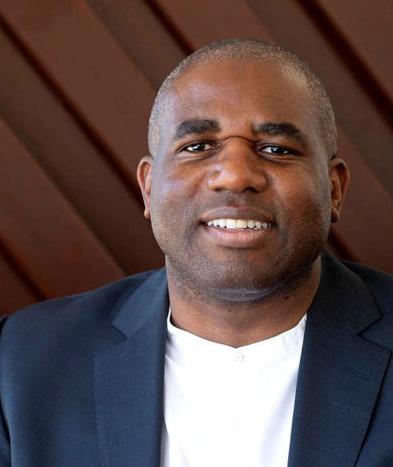
MP has welcomed a report by experts from The University of Manchester which highlighted the issue of racial bias in the justice system, after a meeting to discuss the findings with the academics and co-authors who compiled it.
The report, which was published late last year, raised urgent questions about racial attitudes and practices in the justice system - particularly in the judiciary - in England and Wales.
Drawing on a survey of 373 legal professionals, it found that 95% of respondents said that racial bias plays some role in the processes or outcomes of the justice system, and 29% said it played a ‘fundamental role’. A majority of respondents had witnessed one or more judges acting in a racially biased way towards a defendant and in their decision-making.
Racial discrimination by judges is most frequently directed towards Asian and Black people according to the survey, with people from Black communities - lawyers, witnesses and defendants alike - by far the most common targets of judicial discrimination. Young Black male defendants were the subgroup most frequently mentioned as targets of judicial bias.
Although the judiciary wields enormous power over individuals, its operations are alarmingly under-scrutinised, and judicial racial bias has previously remained largely beyond examination. The evidence in the report rang alarm bells about access to fair trials, hearings and tribunals as well as to equal professional development.
David Lammy, who is Labour MP for Tottenham and a former Shadow Justice Secretary, has previously written a highly critical report about the subject after being commissioned to do so by the then Prime Minister David Cameron in 2016. It found that racial disparities in the criminal justice system in England and Wales were even worse than in the US in some cases.
His report made a series of recommendations including the sealing of criminal records to help former offenders find employment, and the adoption of the German system which allows juvenile law to be applied to young adults if their ‘moral and psychological development’ suggests they are not mature enough to be tried as adults.
“My review recognised the need for action to combat racism and racial bias in the criminal justice system, but action is well overdue,” said Mr Lammy. “Having met with academics and co-authors from The University of Manchester, I welcome their latest report which adds further evidence and provides feedback directly from members of the legal profession and judiciary.”
“Action to embed compulsory antiracist and racial bias training for all judicial office holders, which is a key recommendation of the report, would encourage a culture shift towards antiracist practice.”
“We welcome David’s support for our report, given his longstanding record of campaigning and policy development on these issues,” said Professor Eithne Quinn, lead academic author of the report. “His comments add weight to our central finding: racism in the justice system is corroding principles of fairness and ruining lives. Yet, our survey found that many judges and lawyers have had no recent training about racism and bias.”
“Our report calls for training that is premised on the realities that institutional racism exists in the justice system and that judges, like the rest of us, harbour biases. Without this starting point, any new training won’t work.” ■
10 | SURREYLAWYER FOCUS ON EDI
Lawcourses at UK universities have seen a record number of female applicants in the latest annual data, a freedom of information request has revealed.
Over the last three years, female applications to all law courses in the UK have risen by 13%. Last year, female applications reached triple figures for the first time ever, with over 100,000 applicants compared to just 50,000 male applicants.
Law courses are also proving popular among 18-20-year-olds: UCAS reports there were 15,000 more applications from this age group in the last two years. Overall, applications to study law in the UK have increased by over 17,000 in the past three years.

The data, sourced from UCAS and collated by London criminal defence solicitors Lawtons, details the number of applicants to study all law courses at UK universities. The analysis also highlighted the specific courses being applied for as well as the diversity of demographics entering the legal sector in the UK.
Gender representation in the legal industry
Northern Ireland has seen the greatest increase in female applications, with a 7.6% rise compared to a 5% drop in male applications. Female applications for UK courses from the EU, however, have dropped nearly 40% in the past three years. According to 2022 government data on diversity in the judiciary, there is still a gender gap following university. While women account for 53% of solicitors and 77% of chartered legal executives, they are seen less often in the more senior legal roles. The year-on-year increases in numbers of females applying to study law are promising, but it is clear that more must be done to strengthen their representation at the highest levels of the sector.
Nick Titchener, director at Lawtons Solicitors, said:
“The demand for legal professionals in the UK is increasing twofold. It is essential for prospective applicants to keep an open mind when pursuing a career in law. It is important to do your research to ensure you understand the qualifications required for the specific position you want.
“As well as this, you should identify any relevant work experience opportunities that will help you emphasise your commitment to a career in law, such as holiday schemes, mini pupillages, marshalling or pro bono work.
“The legal industry is competitive yet rewarding and students applying to study in the UK will, in time, help the profession prosper in the years to come”.
Changing demographics: under-21 applications growing UCAS data also reveals the changing age demographic applying to study law in the UK. Last year, there were 15,000 more applications from 18-20-year-olds, whereas applications from over-21s fell 7%.
18-year-olds were responsible for the largest increase in applications, reaching over 100,000 applications in 2022, compared with just 11,000 in the 21-24 age group.
Dr Adrienne Barnett, senior lecturer in Law at Brunel University, said:
“From my experience as a lecturer, there are certainly a lot more women than men studying law at Brunel Law School. The reasons for this are conjecture but I suspect it’s because fewer women study the STEM subjects”
“Comparing my experience of studying law in the late 1970s/early 1980s when there were more male students with the situation now, I think that having more female students enhances the collegiality of the students and peer support” ■
SURREYLAWYER | 11 FOCUS ON EDI
Twice as many women as men applying to study law in the UK, according to UCAS
UCAS data shows male applications have only increased 4% per year over the last three years
Training & Events Programme 2023
APRIL 2023
20.04 | 12.30 – 1.30pm | Webinar | Business Skills
SUPPORTING SURREY – COMMERCIAL AWARENESS & BUSINESS DEVELOPMENT
Catherine Fisher, Managing Partner, Morr & Co
26.04 | 12.00 – 2.00pm | Online Course | PC
CAPITAL GAINS TAX – A GUIDE FOR PRIVATE CLIENT
LAWYERS
Speaker TBC
MAY 2023
24.05 | 12.30 – 1.30pm | Webinar | PC
MANAGING COMPLEX FAMILY DYNAMICS IN THE PROBATE PROCESS
Speaker TBC
Sponsored by Finders International
JUNE 2023
08.06 | 12.30 – 1.30pm | Webinar | Management
MAXIMISING INCOME AND INCREASING YOUR PROFIT
MARGINS: PRACTICAL POINTS FOR FEE EARNERS
Sue Nash, Elite Law Solicitors
15.06 | 6.00 – 10.30pm | Social
PAST PRESIDENT’S CHAMPIONSHIP CUP
Daytona Sandown, More Ln, Esher KT10 8AN
28.06 | 2.00 – 5.00pm | Course | PC
USE OF WILLS, TRUSTS AND VARIATIONS FOR IHT
PLANNING IN THE STEALTH TAX AGE
John Bunker, Irwin Mitchell
Sponsored by Evelyn Partners & Pro Drive
29.06 | 12.00 – 2.00pm | Online Course | Property
RESIDENTIAL CONVEYANCING UPDATE 2023
David Keighley
Sponsored by Landmark Information Group
JULY 2023
06.07 | 12.00 – 2.00pm | Online Course | Family
ADVOCACY IN FAMILY LAW:
A GUIDE FOR SOLICITORS
Stuart Barlow, Bhatia Best Solicitors
13.07 | 6.00 – 10.30pm | Social
LOCAL LAW SOCIETIES NETWORKING
Venue TBC
SEPTEMBER 2023
13.09 | 12.30 – 1.30pm | Webinar | Property
KEY CLAUSES IN RESIDENTIAL LEASES
Ian Quayle, IQ Legal Training
OCTOBER 2023
04.10 | 2.00 – 5.00pm | Course | PC
PRIVATE CLIENT UPDATE 2023: A REVIEW OF CURRENT ISSUES IN PRIVATE CLIENT PRACTICE

Professor Lesley King
Sponsored by Tower Finance & Finders International
11.10 | 12.00 – 2.00pm | Online Course | PC
PENSIONS AND LIFE POLICIES IN THE CONTEXT OF ESTATE PLANNING
John Bunker, Irwin Mitchell
Sponsored by Evelyn Partners
12.10 | 6.30 – 11.45pm | Social
SLS LEGAL AWARDS 2023
G Live, Guildford
NOVEMBER 2023
TBC | TBC | Social | Management MANAGING PARTNERS’ EVENT
Venue TBC
02.11 | 2.00 – 5.00pm | Course | Property
ANTICIPATING AND NAVIGATING THE HURDLE IN ESTATE ADMINISTRATION
Kate Selway KC, Radcliffe Chambers
Sponsored by Southey & Co.
08.11 | 2.00 – 5.00pm | Course | Property
EASEMENTS AND COVENANTS – TIPS AND TRAPS FOR RESIDENTIAL CONVEYANCERS
Ian Quayle, IQ Legal Training
22.11 | 12.30 – 1.30pm | Webinar | Family
DEALING WITH LITIGANTS IN PERSON – TOP TIPS FOR FAMILY LAWYERS
Gemma Kemp, Penningtons Manches Cooper
30.11 | 6.00 – 10.30pm | Social
AGM 2023 & LEGAL BRAIN OF SURREY QUIZ
Venue TBC
DECEMBER 2023
07.12 | 12.30 – 1.30pm | Webinar | Business Skills SUPPORTING SURREY – LEGAL PROJECT MANAGEMENT, HOW IT CAN HELP YOU?
SLS PRICING
Webinars & Workshops (1 hour):
Member Fee: Free of Charge; Non-Member Fee: £25+VAT (including notes and a copy of the recording)
Online Courses (2 hours):
Member Fee: £50+VAT; Non-Member Fee: £100+VAT (including notes and a copy of the recording).
Courses (3 hours):
Member Fee: £95+VAT; Non-Member Fee: £180+VAT (including notes, refreshments and networking).
All courses will be held at the TWM Offices, 65 Woodbridge Road, Guildford GU1 4RD
Social Events & Awards:
Details of fees will be announced with the invitations for each event.
Antony Smith, Legal Project Management
Sponsored by Pro Drive
MEMBER OFFERS
Buy one course (online or in-person) and get a second one of the same type half price. Book one SLS Training course in 2023 and receive a second one at half the price. The two courses must be the same type of training and booked together.
Season Ticket
Book 4 or more courses (online or in person) and receive a 20% discount on those or any further courses booked in the same year. This offer does not apply to the Managing Partner’s Event or any other social events.
To redeem an offer, bookings should be emailed to elouise.enright@surreylawsociety.org.uk, or call Helen on 0333 577 3830 ■
For more information on all Surrey Law Society Training & Events, please visit: www.surreylawsociety.org.uk
12 | SURREYLAWYER
TRAINING & EVENTS
John Perry Memorial Dinner 2023
On 23rd March, Surrey Law Society hosted its second John Perry Memorial Dinner at the beautiful Glenmore House in Surbiton. The event was introduced to the Society’s calendar in 2022 as a way to commemorate the enormous amount of work carried out for SLS by Past President John Perry and we were delighted to again host John’s widow Rosemary and his daughter Lucy at our 2023 event.
As with the previous year, it was fantastic to welcome members past and present on the evening, including a number of past Presidents and a past CEO, who came together to enjoy the occasion. Guests were treated to a drinks reception, 3-course meal and some phenomenal musical accompaniment for the evening from our incredible band, the Post Modern Jazz Cats.
Over the course of the evening we raised money for President Madeleine Beresford’s nominated charity for the year, the Samson Centre and were delighted that Paul Dimmock from the charity was able to join us on the evening. Guests were challenged to a game of North or South to raise funds for the
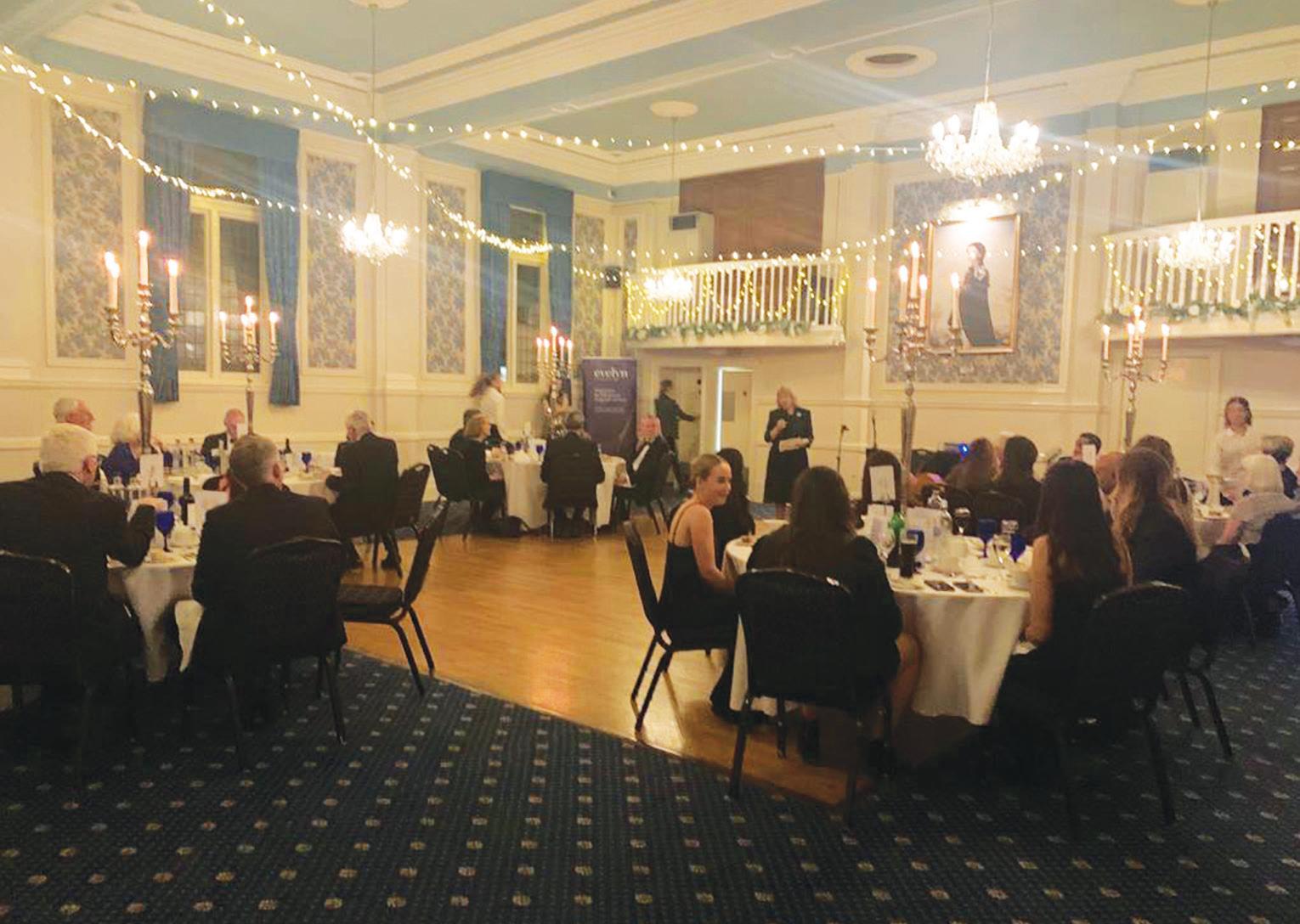
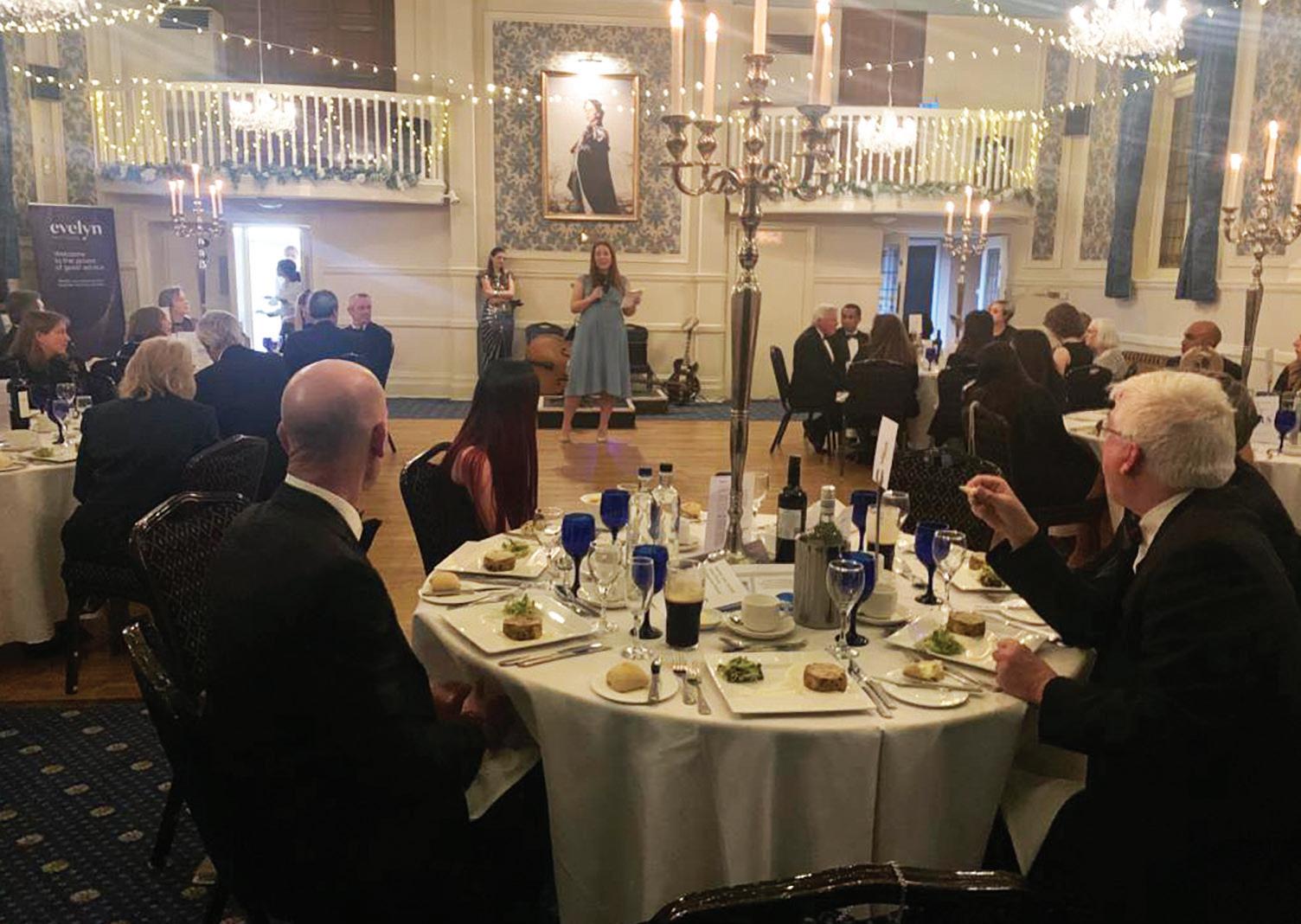
Chris Andrews Memorial Client Interviewing Competition 2023
In March, SLS was thrilled to sponsor and support the Chris Andrews Memorial Client Interviewing Competition again, which this year took place at the Royal Holloway University
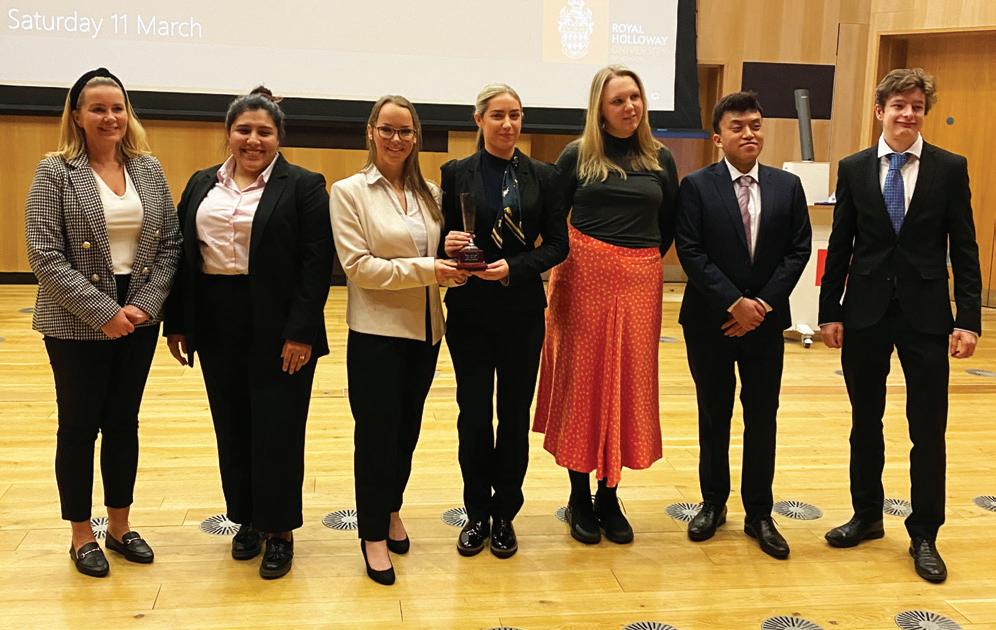
The Chris Andrews Memorial Client Interviewing Competition started in 2005; it is a three-way competition between the University of Surrey, the University of Law (Guildford Campus) and Royal Holloway, University of London, with each institution taking it in turns to host the competition.
Teams from each institution take part in the competition, with each team comprising of two students. They are interviewed for up to 30 minutes on a particular scenario and up to two different fact patterns. The interviews are judged by legal practitioners who are also members of the Surrey Law Society.
Each team is judged according to the National Client Interviewing Competition criteria, including ten components, namely establishing an effective professional relationship, obtaining information, learning the client’s expectations and needs,
The event was sponsored by a number of our patrons, Evelyn Partners, Landmark Information Group, Southey & Co and Tower Street Finance, and we are as ever so grateful for their support. It was also fantastic to see John, Wayne and Mike from Evelyn Partners and Barry and Michael from Southey & Co on the evening.
It’s always a pleasure to bring members together for our social events, but the John Perry Memorial Dinner feels particularly special as it affords an opportunity to reconnect with a number of past members, many of whom gave their time generously to support the Surrey Law Society. John was a firm believer in enjoying life and bringing people together and we hope that this dinner provided an opportunity for the SLS membership to continue in the same vein. ■
problem analysis, legal analysis and giving advice, developing reasoned courses of action, assisting the client to make an informed choice, effectively concluding the interview, teamwork, and ethical behaviour. At the end of the interviews the judges provide valuable feedback to each team on their performances and deliberate as a panel to decide upon the winners.
Following deliberation, Past President of Surrey Law Society, Victoria Clark, announced the winners of the competition and awarded prizes. The first prize was won by Megan Williams and Abigail Summers from the Royal Holloway; the second prize was won by Antonieta E Alvarez Angles and Holly Flynn from the University of Surrey; and the third prize was won by MinSeog Kim and Daniel Newman from the Royal Holloway. ■
SURREYLAWYER | 13 EVENTS
Samson Centre and it was Lauren Keir from Rosewood Solicitors who reigned triumphant and took home our M&S Hamper of Goodies!
LEGAL AWARDS 2023
THE SLS LEGAL AWARDS ARE BACK!
Thursday 12th October 2023 –
And we have some very exciting news about this year’s event.
We are so thrilled to announce that this year’s SLS Legal Awards are going to be bigger and better than ever before and to facilitate more attendees and an even bigger production, we are moving this year’s ceremony to G Live in Guildford. We’ll be taking over the entire theatre in what promises to be our most spectacular event yet. To enable us to accommodate this, we are moving the date of our Awards this year to THURSDAY 12TH OCTOBER, so please do SAVE THE DATE , so that you can make your table reservations when booking opens in the near future. In terms of nominations, you are hopefully already aware
1. Law Firm of the Year
Why does your firm stand out from the rest? This award should demonstrate why your firm has a winning formula and highlight your significant progress and development as a business within the last 12 months. The judges will be looking for evidence of excellence including:
• A strong reputation and public profile
• A rounded approach to the delivery of legal services
• First class client care – testimonials and a strong strategy will help.
• A commitment to a diverse and inclusive practice.

• Effective management – do your staff achieve the best possible results?
• Strong staff engagement and training – how is this achieved?
• Great teamwork – demonstrate how your teams work so well.
• Engaging CSR programme – how do you have a positive impact on your community and environment?


• Culture of innovation – how do you take advantage of advances in knowledge and technology?
• Deep expertise in areas of practice.
Nominee firms will be able to demonstrate a clear vision for their business and how that is being achieved. Evidence of excellence might include testimonials, accreditations, awards and the sharing of results.
3. Employer of the Year
This award gives you the opportunity to be publicly recognised within the region as a great employer of choice where people really want to work.
In order to attract and retain the best talent, your employer brand is a key differentiator in the marketplace.
The judges will be looking for compelling evidence that you are committed to creating a great place to work and that employees are really engaged in their work.
The judges will expect to see clear policies, commitment and best practice in:
• Creating a supportive and happy culture.
• Strong leadership that trusts, empowers and engages staff at all levels.
• How employees are challenged and fulfilled in their roles.
• How employees are recognised and rewarded for their job.
• How staff feel about working for you and how fairly they feel treated.
• Employee Benefits.
• How employees are trained and developed to achieve their potential.
• How employees’ wellbeing is considered and managed.
of all the new categories that we have introduced for 2023, details of which can be found below, and because the date of the Awards is a little later, we are pleased that we can give you a little longer for your nominations too and have extended the deadline until Thursday 11th May
So, take a look at the categories and have a think about which ones are for you and get your nominations in before the deadline. We can’t wait to see you at our brand new venue on 12th October.
2. Lawyer of the Year
This prestigious award will be given to a talented lawyer who will have achieved particular recognition for their professional work and / or their work in their community or charitable body. The judges will be looking for candidates who can show:
• A genuine interest in their clients – testimonials and evidence of going the extra mile will help.
• Support and inspiration to their colleagues – how they impacted on those around them in the last year?
• Active engagement in their community through CSR activity or in a personal capacity.
The judges will be looking for entrants who go “above and beyond” in both their colleagues’ eyes and the eyes of their clients. There are many factors that the Judges can consider but will be looking for evidence of great client care, involvement in CSR activities, personal development, team working, leadership, empathy and professional respect. The nominee should also be able to show strong management and leadership skills.
4. Equality and Diversity Champion of the Year
This award recognises an individual, team or firm who have made a significant contribution to diversity within and across the legal profession over the past three years.
The intention is to highlight both the leadership demonstrated and the best practice they have exemplified (through the impact of their work).
This category is open to any person, team or firm who have excelled in this area. Judges will look for meaningful and measurable impact of diversity practices within the business and what this looks like in the future also.
14 | SURREYLAWYER SLS AWARDS 2023
–
5. Family Law Team of the Year
The Family Law Team of the Year Award recognises a team who has made a major contribution to the field of family law through their practice. The team must demonstrate excellence in family law practice and the judges will be looking for evidence of this through areas such as:
• An outstanding quality of legal services for your clients, testimonials and evidence of going the extra mile will help.
• Excellent teamwork with your colleagues and across your firm; isolate the most important factor that has contributed to the success of your team over the qualifying period.
• Building a collaborative approach with external lawyers and/or other professionals.
• A commitment to innovation in the practice of family law, either within your firm or more generally across the sector.
• Evidence of success in a particularly complex case that had significant outcomes, explain why it had a major impact on your team and your client.
Nominations will be accepted from a team of solicitors or a group of legal professionals acting within the practice of family law.
7. Legal Aid Lawyer of the Year
This award celebrates the commitment of the many Solicitors that tirelessly represent clients who must rely on Legal Aid. Their work supports many on the fringes of our society and requires considerable resilience and dedication for limited remuneration.
We are looking for nominees who can demonstrate:
• Exceptional dedication to their clients.
• A determination to see the end result.
• Great results that make a difference.
• Absolute professionalism.
• Outstanding commitment to access to justice.
Nominations may be made by clients, members of the public or colleagues.
9. Private Client Team of the Year
This award recognises the top private client teams in the county. The team must demonstrate excellence in private client practice and the judges will be looking for evidence of this through areas such as:
• An outstanding quality of legal services for your clients, testimonials and evidence of going the extra mile will help.
• Excellent teamwork with your colleagues and across your firm; isolate the most important factor that has contributed to the success of your team over the qualifying period.
• Building a collaborative approach with external lawyers and/or other professionals.
• A commitment to innovation in the practice of private client law, either within your firm or more generally across the sector.



• Evidence of success in a particularly complex case that had significant outcomes, explain why it had a major impact on your team and your client. Nominations will be accepted from a team of solicitors or a group of legal professionals acting within the practice of private client law.
11. Support Team Member of the Year
Nominations are welcome from colleagues or clients for paralegals, secretaries, cashiers, apprentices and others who support Surrey Law Society solicitor members.
Nominations should demonstrate how the staff member has made a special contribution to their organisation or to specific clients. The Judges will expect this individual to have shown dedication and motivation beyond the call of duty.
Particular note will be made of those activities that have improved the organisation’s efficiency and reputation and/ or the reputation of the profession generally.
6. Junior Lawyer of the Year
This award celebrates an exceptional standard of work as well as great dedication to the role of a junior lawyer. The judges are looking for a lawyer who is excelling in their role or making a significant contribution to voluntary or pro-bono schemes.
The winner will be going beyond what is expected of a junior lawyer and bringing insight, flair, imagination and hard work to everything they do. Initiatives could include:
• setting up a new and profitable income stream for the firm or organisation.
• leading in a ground-breaking area of practice.
• leading on a case which has led to a change in the law.
• being considered an expert in your area of practice by fellow professionals
• and more…
The judges want to see evidence of:
• significant contribution to legal services through their work as a junior lawyer.
• positive social or commercial impact through their actions.
• creativity and hard work consistently demonstrated.
The Law Society describe a junior lawyer as solicitor apprentices, LPC students, LPC graduates (including those working as paralegals), trainee solicitors, and solicitors with up to five years post qualification experience.
8. Lifetime Achievement Award
This award will be presented to the individual who, in the opinion of the Judges, has made an exceptional contribution to the reputation of solicitors during their career as a solicitor in Surrey. Whilst entries could be based on any number of criteria, candidates will be an exemplar of the legal profession having demonstrated high standards of integrity in their endeavours. It is expected that any nominee will:
• have the ultimate respect of their colleagues.
• have shown absolute dedication to their clients.
• be a leader in their area of practice.
• be a mentor to those with whom they have worked.
• worked to uphold the Rule of Law
• be a consummate professional.
• stand out from the crowd.
10. Property Law Team of the Year
This award recognises the top property law/conveyancing teams in the county. The team must demonstrate excellence in property law practice and the judges will be looking for evidence of this through areas such as:
• An outstanding quality of legal services for your clients, testimonials and evidence of going the extra mile will help.
• Excellent teamwork with your colleagues and across your firm; isolate the most important factor that has contributed to the success of your team over the qualifying period.
• Building a collaborative approach with external lawyers and/or other professionals.
• A commitment to innovation in the practice of property law, either within your firm or more generally across the sector.
• Evidence of success in a particularly complex case that had significant outcomes, explain why it had a major impact on your team and your client. Nominations will be accepted from a team of solicitors or a group of legal professionals acting within the practice of property law. We will accept entries from both commercial and residential property lawyers and landlord and tenant specialists.
12. Team of the Year
Teams from private practice law firms and in-house lawyer departments in commerce or public service are invited to enter for this award.
Great teamwork is an essential part of modern business and especially so in legal practice where a combination of skill sets is needed.
Entries should show:
• The purpose of the team, why it was formed.
• What objectives are set and how are they achieved?
• How is the team motivated?
• Highlights from the last year.
As well as demonstrating a culture of teamwork entrants should show how, through the combination of effort, they have achieved excellence in the delivery of services and/or made a significant contribution to their community. Evidence of client perception of teamwork would also assist the judges. Particular note will be taken of activities ‘beyond the call of duty’.
SURREYLAWYER | 15
SLS AWARDS 2023
Council Member’s Report
As we enter into another year, we find ourselves in a turmoil of interest rate increases and banks failing.
This year’s Survey shows the Top Ten Business Risks for solicitors:
1. Cyber incidents (malware, data breach, ransomware, hacking cybercrime) 34% Ranked #1 in 2022
2. Business interruption (inc. Covid and supply chains) 34% Ranked #2 in 2022
3. Changes in legislation and regulation 19% Ranked #5 in 2022 (trade wars, tariffs, sanctions, Brexit, Eurozone changes, protectionism)
4. Natural catastrophes (flood, storm, wildfires, extreme weather)
19% Ranked #3 in 2022
5. Climate change 17% Ranked #6 in 2022 (physical, operational and financial risks due to global warming)
6. Fire, explosion 14% Ranked #7 in 2022
7. Macro-economic developments (inflation, deflation, monetary policy) 25% Ranked #10 in 2022
8. Energy crisis (supply shortage, price fluctuation, outage) 22% New entry in Top 10
9. Talent shortage 14% Ranked #9 in 2022
10. Political risks and violence 13% (riots, war, terrorism, political instability, civil commotion) Ranked #13 in 2022
All these are having a great impact for members operating in these environments and for business clients and the advice that has to be given. This is a never-ending pressure on our members.
Just a quick update on accreditations: CQS has now released a certificate exam for re-accreditation applications, and they released this in late February this year. Those applying for reaccreditation will have to do the exam before submitting their application.
As for other news, TLS are recruiting Independent Members to the Board and if anyone feels that they would like to come on to the Board then please do visit Green Park’s website ; https://micro. green-park.co.uk/tls/. Green Park is the recruitment company appointed by the Law Society. If anyone would like any further information, I am happy to discuss this as I am a Council Member on the Board.
I hope all of you will check that your “My Law Society” is updated so that you can continue to receive updates and practice notes from the Law Society.
As usual, if you have any matters that you wish to raise with the Law Society then please do not hesitate to contact me or Alastair. Wishing all of you a wonderful Easter break. ■
Sushila

 Council Member and Board Member of the Law Society
Council Member and Board Member of the Law Society
Surrey Junior Lawyers Division
Things have been very busy for us here at Surrey JLD! In February, we held our very first Ball – and what a night it was. 150 members, colleagues and friends joined us at the Harbour Hotel in Guildford all in aid of raising money for the Emily Ash Trust. We raised over £3,000 for this excellent charity, whose primary aim is to support families who have a child, teenager or young adult with cancer. We were lucky to be joined by Emily Ash herself and she was able to explain first hand how she and her family were impacted by her leukaemia diagnosis back in 2002 and how the charity helps provide light relief to families in need. The charity helps organise and fund a range of activities for families, from build a bear days to caravan holidays. We hope our donation will help lots of families in need. The evening was a great success, and we are already looking forward to next years ball! The event would not have been possible without our generous sponsors and our amazing committee who dedicated a lot of time organising the evening. Thank you to everyone involved in planning the event, our sponsors and those who came. We hope you had a great night!
As spring is round the corner and warmer weather is hopefully on its way, our calendar is getting booked up! Keep your eyes peeled for more information about our next Quarterly Networking Event and an NQ masterclass coming up soon.
Here at Surrey JLD, we are passionate about supporting the wellbeing of our members. We have a Wellbeing Hub on our website which provides resources, tips, quotes and posts on physical and mental wellbeing. Over the next few weeks and months, we will be adding blog posts from our committee members with our own experiences and wellbeing tips. We will also be hosting an in-person Cocoa so our members can have a coffee and a chat together. More details will be circulated to our members soon.
Looking forward to seeing lots of you at our events soon. ■
By Kim Wintle Chair, SLJD
16 | SURREYLAWYER COUNCIL MEMBER’S REPORT/ JLD
Abraham
Sushila Abraham
The UK Property Market –Is it doom and gloom?
Unless you have been living under a rock for the last few years, it won’t have escaped your attention that the UK property market has been in state of boom to say the least and now, according to the media, it teeters on the edge of a catastrophic freefall bringing prices crashing to the floor accompanied by a property fire sale. Well, like most headlines, there is a story behind that which provides some context that allows us to get the full picture.
On a national level, if we take the same period in 2023 and compare it to the same period in 2019, (which is the last resemblance of a normal property market!) the number of new properties coming to the market has decreased, but only by 3.8%.
So, sellers are clearly still coming to the market, but the number of properties selling is often seen as a better indicator of how the property market is performing. Again, taking the same period in 2023 and compare it to 2019, the accumulative net sales in 2023 are at 92.3% of 2019 levels. This hardly paints a picture of doom and gloom that the media so artfully creates for us.
Of course, another key factor, and perhaps more importantly, is what is happening to property prices. Are property prices falling? Are properties still selling consistently over the asking price? Will there be a price crash?
As a serial Rightmove stalker myself, I have noticed a lot more properties locally to me recently are showing as “Reduced”. This is being seen across the market as a whole and currently reductions in asking prices are at the highest level they have been since 2019. So, does this mean that prices are falling?
Well not quite. This just means that people who are looking to sell and have been on the market for a while are now having to react to a cooling market and be more realistic about the price they will achieve for their home, or in some cases remove their property from the market and stay put.
But what about the prices of new properties coming to the market? Well, again taking the same period in 2019, so far in 2023 the average asking price is £91,032 higher and indeed, the story is similar taking into account the average selling price which is £65,969 higher in 2023 compared to 2019.
Michael Edwards

So, the story so far is that lots of properties are coming to market, asking prices are still high, selling prices are also still up, but reductions in asking prices are higher also. Place this in a glass, add a dash of interest rates up and downs, stir well and you are left with the UK Property Market: A State of Flux.
This is of course a slightly tongue in cheek view of the UK property market, but as many property professionals might well tell you, there is no doubt that the market is cooling down, but in fairness it needed to and all the data points at the market returning to 2019 activity levels.
The main issue facing anyone selling a property right now is getting the valuation correct. Get it too high and you won’t sell, get it too low and you sell under the market value. Given the context of this publication, for anyone handling property currently, getting the valuation correct requires expert handling and of course the stakes involved of getting the valuation too high or too low, specifically for tax purposes, are significantly higher than the property sitting on the market for too long. That would bring a different type of doom and gloom to your door.
This is why at Southey & Co, as Chartered Surveyors, we specialise in providing Red Book property valuations to make sure that we get the correct valuation and, most importantly mitigate the risk for you and your clients.
Going even further, with our concierge service and our expert knowledge of all things property, we can make your life easier with all things property related including insurance, maintenance, chattels, IHT funding and property sales.
One call and it’s off your desk and onto ours, to a single point of contact all designed to make your life easier.
For more information, go our to our website www.southeyandco.co.uk, email me directly on michael.edwards@southeyandco.co.uk or call me directly on 0207 1015955 ■
By Michael Edwards, Southey & Co
SURREYLAWYER | 17 ARTICLE
THE PERSECUTION OF LAWYERS
By Alastair Logan OBE., LL.B Council Member for the Surrey Constituency
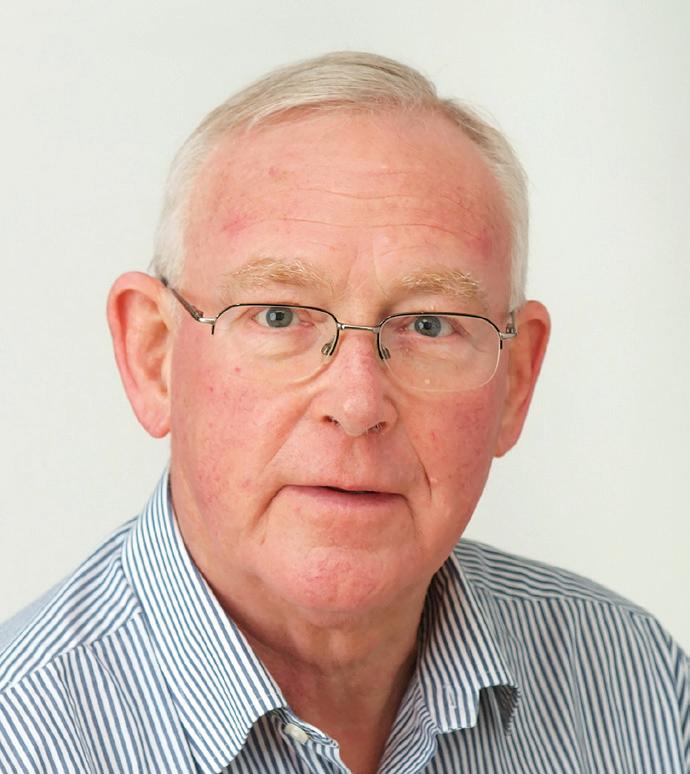
“Just as a duck quacks and a dog barks, so do they blast off at lawyers. Judges are easy targets because as a rule they cannot answer back. Being nice to lawyers is not a popular cause. But Johnson and Patel (and Braverman –my addition) will not convert a single voter who does not already support them. It’s just noise and not even as good as Dick the Butcher’s recipe for improving the country in Shakespeare’s Henry VI, Part 2: “The first thing we do, let's kill all the lawyers”. – Lord Garnier KC
Has the public view of lawyers changed from the Dickensian view?
Charles Dickens became a clerk in a firm of solicitors in 1828 and gained first-hand knowledge of the law and lawyers. Subsequently he was a court reporter, and his understanding and views of law and lawyers are found in many of the books that he wrote. His view was that lawyers were expensive, mysterious, sometimes dishonest and able to communicate in obscure language to the exclusion of those not trained in the law. He also said they were socially awkward. Today’s politicians have a track record of abusing lawyers and Judges by attributing to them motives of a political nature to explain why they challenge or fail to support government policy and legislation. Comments such as “lefty lawyers”, “do-gooders”, “lefty blob”, “activist lawyers” and “lefty human rights lawyers” are simply part of the vacuous language of the current political elite and speaks volumes about their lack of quality and mendacity as they know that without lawyers there would be no legislation and the government of the country would be impossible without them. Lawyers are an essential to a democratic society, the maintenance of the Rule of Law and the Justice system. As Law Society President Lubna Shuja says: “The rule of law is vital to society and democracy. I strongly believe the public should know more about what it does for them and why it is important in their day-to-day lives”. But these attacks also speak to the quality of the lawyers they target because those lawyers are doing their job in upholding the Rule of Law, access to Justice and ensuring that the law is fairly applied to all.
If we think that attacks on lawyers are damaging, we should recognise that in other jurisdictions lawyers who carry out their work face more than abuse. They face at the minimum loss of the ability to practice and in far too many cases loss of life.
More lawyers have been killed in the five years since President Rodrigo Duterte took office than under any other government in Philippine history. Data collated by the news website Rappler found that 110 lawyers were killed from 1972 to the present. Sixty-one of those killings have taken place since 2016. Since 2004, charges have been filed in just seven cases in which lawyers were victims, underscoring the lack of accountability.
More than 400 Colombian lawyers have been murdered since 1991 but no one has been prosecuted for a single killing, according to a devastating report from 42 British solicitors, barristers and judges who visited Colombia last year. Colombian human rights lawyer Alirio Uribe said there are four million displaced people in his country – or 9% of the population. Some 13,000 civilians have been killed in the last six years, including indigenous peoples, journalists, trade unionists and judges. About 25,000 people have ‘disappeared’, and thousands more arbitrarily detained or kidnapped by
guerrillas or criminals for ransom. Uribe said: ‘There were 40 lawyers killed last year alone. They were persecuted because they were associated with the "crimes" or sympathies of their clients. If they are willing to defend them, the logic goes, then they must be fellow travellers.’
Turkey has an unenviable record of persecuting lawyers. Deep flaws in the judicial system have been created and are not addressed. Opposition politicians, journalists, lawyers and human rights defenders and others faced baseless investigations, prosecutions and convictions. By way of background Turkey has withdrawn from the Istanbul Convention . Government officials targeted LGBTI people with homophobic rhetoric. Freedom of peaceful assembly has been severely curtailed. A new law unduly restricted freedom of association for civil society organizations. Serious and credible allegations of torture and other ill-treatment have been made. Turkey has hosted 5.2 million migrants and refugees, but thousands of asylum seekers were denied entry. Physical attacks against refugees and migrants increased in the context of rising anti-refugee rhetoric.
In the wake of the 12 September 1980 military coup in Turkey , an estimated one million people were detained, thousands were tortured, many died in custody or were forcibly disappeared, over 100,000 people were tried in military courts in proceedings that violated fair trial principles, and 50 people were sentenced to the death penalty and hanged. A provision in the 1982 Constitution gave immunity from any form of prosecution for all crimes committed by the leaders of the military coup, all military officials, public officials and authorities from 12 September, 1980, to 9 November, 1983, after a general election had taken place. Although this provision was revoked in 2010, and a criminal case was filed against the two surviving leaders of the 1980 coup, the ex- leader Gen Kenan Evren and Gen Tahsin Sahinkaya, and they were both sentenced to life-time incarceration in 2014, both defendants died without serving a single day of their sentences. Nobody has been prosecuted for the horrific torture practices that took place in military prisons between 1980 and 1983.
Between the years 1990 and 1996, torture was systematically practised throughout the country. The mass violations of human rights in the mainly Kurdish-populated Southeast and Eastern regions of Turkey in the 1990s took the form of enforced disappearances and killings by unknown perpetrators, which the state authorities showed no willingness to investigate. Villages where around one million people lived were evacuated and destroyed by the security forces during the conflict with the PKK. Enforced disappearances became a pattern in human rights violations against Kurdish civilians. A coalition consisting of various human rights NGOs has collected the names of more than 1,300 persons who were allegedly disappeared by state agents between the late 1980s and 2002 (the year the emergency rule was lifted), mostly in the Kurdish region. Although, in the 2000s, during the democratization period, a hope for justice arose, after the AKP Government of President Erdogan founded a political alliance with the Nationalist Movement Party, as well as an alliance within the bureaucracy and the Council of Judges and Prosecutors, all investigations and criminal cases with regard to 1990s’ human rights violations have ended with decisions for acquittal, dismissal or nonprosecution.
18 | SURREYLAWYER FEATURE
Alastair Logan OBE
In the 2013 report , the UN Special Rapporteur found a large number of concerns. These identify the ways in which oppressive regimes in general and Turkey in particular can undermine the Rule of Law. The most important in Turkey are as follows:
1. Article 17 of the Constitution, which stipulates the right to life, does not provide sufficient safeguards, and it bears the risk that the interpretation of Article 17 is very broad, resulting in an inadequate understanding of the conditions under which life may be taken;
2. Legal framework for the use of force by law enforcement agents, and for counterterrorism, are vague, and therefore may potentially go beyond the powers permitted under international law, including the right to life;
3. Impunity is the main challenge concerning the right to life in Turkey. This is widely believed to be the result of a lack of the political will to hold State officials, in particular, accountable;
4. Delays in judicial proceedings continue to constitute one of Turkey’s longstanding challenges, and this has clear implications for accountability. The application of the statute of limitations for unlawful killing offences further aggravates the climate of impunity;
5. The low conviction rate of public officials in Turkey is another disincentive for the lodging of complaints;
6. The foregoing barriers are reinforced by the fact that, in many cases, where a public official becomes the subject of investigation, that person is allowed to remain on active duty. Furthermore, in some cases, officials who have been involved in, or are suspected of having been involved in, serious human rights violations, are promoted, rather than prosecuted or convicted;
7. The practice of reprisal frustrates the seeking of justice;
8. Prosecutorial and judicial discretion about how to shape the legal proceedings also plays into the absence of accountability for unlawful killings;
9. There is an overly close connection between judges and prosecutors, as well as between the judiciary and the executive, and this casts doubt on the independence and impartiality of the judiciary in Turkey. It also has clear implications for accountability in the context of the right to life;
10. There are significant doubts on the independence of the Turkish Human Rights Institution (THRI).
After the coup attempt of 15th July, 2016, the Turkish Government declared a State of Emergency which lasted two years. This State of Emergency became a breaking point in terms of fundamental rights in Turkey. The Government enacted thirty-two decree laws, of which three (Nos. 667,668,696) offered complete impunity for public servants and civilians. President Erdogan said, “We will eradicate this cancer [the Gülen movement] from the body of this country and the state. They will not enjoy the right to life. … Our fight against them will continue until the end. We will not leave them wounded.” Mehmet Metiner, a ruling party MP, who also serves as the Chair of the parliamentary sub-committee on prisons, once stated that the commission would not investigate allegations of torture against Gülen supporters in prisons. Addressing AKP supporters, the former Economy Minister, Nihat Zeybekçi, said, “We will punish them in such a way that they will say, ‘I wish I were dead’. They will not see a human face and they will not hear a human voice. They will die like sewer rats in cells of 1.5–2 square meters.”
The Emergency Decree Laws offering absolute criminal, civil and disciplinary impunity for any kind of act carried out to suppress a coup attempt or a terrorist act, along with restrictions imposed on the rights of suspects and the powers of lawyers, have made obsolete almost all safeguards against torture and ill-treatment. Under these provisions, public prosecutors across Turkey have rendered non-prosecution decisions on criminal complaints that were filed for alleged murder, extrajudicial-killing and torture incidents. Human Rights Watch’s 2018 report states cases of torture and ill-treatment in police custody were widely reported throughout 2017, especially by individuals who were detained under the anti-terror law, marking a reversal of long-standing progress, despite the government’s stated zero tolerance of torture policy. There were widespread reports of police beating detainees, subjecting them to prolonged stress positions and threats of rape, threats to lawyers, and interference with medical examinations. Because of the oppression in the country, neither detainees nor their lawyers are able to pursue the violations committed in the prisons by means of either judicial or administrative remedies, and, for the same reasons, they cannot make these violations known to the public.
Turkey’s top judicial body, the Council of Judges and Prosecutors (HSYK/ CJP), was reshaped by the AKP Government twice, in 2010 and 2017. The present structure of the CJP has been a cause for serious concern, in terms of its independence and the impartiality of the judiciary as a whole. The Council of Europe’s Human Rights Commissioner stated:
“.. the new composition of the HSYK (CJP) does not offer adequate safeguards for the independence of the judiciary, and it considerably increases the risk of it being subjected to political influence. (T)he independence of the Turkish judiciary has been seriously eroded during this period, including through constitutional changes regarding the Council of Judges and Prosecutors which are in clear contradiction with Council of Europe standards, and the suspension of ordinary safeguards and procedures for the dismissal, recruitment and appointment of judges and prosecutors”
An incident took place on 14 April, 2019, when a lawyer, Sertug Sürenoglu, asked police why traffic was blocked around the city’s Çıragan Palace, where Erdogan was in attendance for a high profile wedding. After his question, Lawyer Sürenoglu was arbitrarily detained and subjected to torture for hours by President Erdogan’s security detail. Images of his black and blue face were broadcast in the national media. Several Bar Associations filed criminal complaints about President Erdogan’s security detail. However, while the victim of torture had been subjected to house arrest, a non-prosecution decision was given in relation to those police officers who had tortured him because the Governor of Istanbul refused permission to investigate the incident.
On 26 February 2020, the Ankara Bar Association published a report establishing several breaches of the relevant national and international laws regarding the enforced disappearance of seven individuals in 2019, and the conduct of the police and the judiciary in relation to these incidents. In addition, a coalition, consisting of nine media outlets from different countries, documented the Turkish Government’s illegal rendition and abduction operation and the black sites of the Turkish National Intelligence Agency (NIA/MIT), where victims have been tortured for months at a time.
In 2020 a coalition of NGOs consisting of the Ankara Medical Chamber (ATO), the Human Rights Association, the Lawyers Association for Freedom, the Contemporary Lawyers’ Association, the Rights Initiative Association, the Revolutionary 78’ers Federation, the Human Rights Agenda Association, the SES Ankara Branch, and the Human Rights Foundation of Turkey (TIHV), made a joint statement regarding the torture and ill-treatment incidents that had taken place in Turkey, and in Ankara, in particular. “There has been an increase in kidnapping, torture and ill-treatment in custody, with the aim of exerting pressure on people, punishing, intimidating and forcing them to confess, which started, in particular, with the State of Emergency process, and which has increased in recent years. In the case of Ankara, these practices have unfortunately become systematic.” said the statement . However, neither the Prosecutor’s office nor the Government officials have taken any steps to stop the torture and/or to investigate the incidents.
According to a statement by Amnesty International, Turkish lawyers arrested in September 2020 were mainly questioned in relation to their professional activities such as the types of cases they litigate and the number of cases related to suspects alleged to have links with the Gülen movement; contractual and monetary relations with their clients; how they find their clients; the average fee charged to the clients and their professional relations with other lawyers, such as attending each other’s hearings or allocating case files to each other, implying an organizational relationship. They were also interrogated in relation to their historic mobile traffic search (HTS) records and wiretapped telephone conversations with their clients and colleagues which should have remained confidential to protect lawyerclient confidentiality.
Since 2016’s coup attempt, there has been a relentless campaign of arrests which has targeted lawyers across the country. In 77 of Turkey’s 81 provinces, lawyers have been detained, prosecuted and convicted due to alleged terror-linked offences. As of today, more than 1.600 lawyers have been prosecuted and a further 615 lawyers have been arrested and have been remanded to pretrial detention. So far, 450 lawyers have been
SURREYLAWYER | 19 FEATURE
sentenced to a total of 2,786 years in prison on the grounds of membership of an armed terrorism organization or of spreading terrorist propaganda.
Here are some examples:
Fevzi Kayacan was the president of the Konya Bar Association from 2010 to 2016, one of the largest bar associations in Turkey. During his presidency, Kayacan led many efforts to promote human rights and democracy. Only 5 days after the failed coup attempt, detention warrants were issued for 45 members of the Konya Bar Association, including Kayacan. He was subsequently arrested on 21 July 2016, detained on 22 July and the Konya 6th High Penal Court sentenced him on 27 October 2017 to 10 years and 6 months imprisonment. Kayacan was convicted of being a member of the Fetullahist Terrorist Organization (FETÖ) under Art 314 (2) TPC, although there was no evidence related to terrorism. He was convicted for his affiliations and social contacts.
Eren Keskin is a human rights lawyer, co-president of the Human Rights Association (IHD), founder of the Legal Aid Bureau against Sexual Harassment and Rape in Custody, an honorary member of the Paris Bar Association, the winner of multiple international awards for her peace and human rights work, including the 2018 Helsinki Civil Society Award, and was the 2018 finalist of Martin Ennals Award for Human Rights Defenders. Furthermore, Keskin was the editor-in-chief of the newspaper Özgür Gündem (‘Free Agenda’) from 2013 to 2016 and joined the “co-editor-inchief” campaign, which was organised between May and August 2016, support imprisoned editorial staff of the newspaper. Özgür Gündem was shut down by the Emergency Decree no. 675 on 29 October 2016 over “terrorist propaganda” allegations. Due to her work and role at Özgur Gündem, 143 cases have been filed against Keskin.
So far, Keskin was sentenced to a total of 17.5 years in prison: On 30 March 2018, the Istanbul 2nd Criminal Court of First Instance sentenced her to 7.5 years in prison under Article 301 TCP ("degrading the Turkish nation, the Republic, institutions and organs of the state") and Art 299 TPC ("insulting the President of the Republic of Turkey"). On 21 May 2019, the Istanbul 14th Heavy Penal Court convicted her under Art 7 (2) Anti-Terror Law (“propagandising for a terrorist organisation”) and sentenced her to three years and nine months in prison. On 15 February 2021, the Istanbul 23rd Heavy Penal Court sentenced her to six years and three months under Art 314 (2) TPC (“membership of an armed terrorist organisation”). These prison sentences are consecutive and are still pending before the Court of Appeal.
Ebru Timtik, human rights lawyer and member of the Progressive Lawyers’ Association was detained in September 2018. On 20.03.2019, she was convicted under Art 314 (2) TPC and sentenced to 13 years and six months. It was alleged that there is a relationship between her activities and DHKP-C, due to her representation of numerous clients accused of being DHKP-C members, participating in human rights protests, inviting clients to exercise their right to silence, or possessing books of left-wing authors. Timtik died on 27 August 2020, the 238th day of a hunger strike to protest the irregularities in her trial and to express serious concerns about judicial independence. She was transferred to hospital from Silivri Prison on 30 July following a court order which ruled against her release on health grounds. This was despite a report from the Forensic Medicine Institution which concluded that her health was not good enough to be kept in prison.
Feti Ün was the lawyer to Fethullah Gülen between 1990 and 1994. Ün was detained after the coup attempt on 16.11.2016 and sentenced to 12 years on 20.11.2017. The 16th Criminal Chamber of the Supreme Court of Appeals upheld the prison sentence under Art 314 (2) TPC in October 2020. He is over 70 years old and was convicted because of his representation of Gülen in the 1990s.
Talip Nayir, board member of Erzincan Bar, was detained on 25.10.2016. He was convicted and sentenced to 10 years under Art 314 (2) TPC for using the encrypted messenger application ByLock, the profile of his clients (i.e., private schools affiliated with the Gülen movement) and his social media posts.
Prominent lawyers and jurists from around the globe have expressed concerns about Turkey’s ongoing crackdown on lawyers. Lawyers have particularly been targeted due to the identities or affinities of their clients. Scores of lawyers who were defending Gülen-linked suspects have been arrested due to alleged Gülen ties in the last five years.
Stefan von Raumer, chair of the Human Rights Committee of the CCBE, was quoted as saying “The CCBE (the Council of Bars and Law Societies of Europe), as the voice of European legal profession, is very concerned about the continued derogation of the essential rights of lawyers and the lack of respect of their independence in Turkey over the past years. We have seen a systematic and continuous violation, in hundreds of cases, of several of the UN Basic Principles on the Role of Lawyers, including Principle 18 which clearly states that lawyers should not be identified with their clients or their clients’ cause in the exercise of their functions”.
And just in case we thought the killing of lawyers was something that happens in other countries we should not forget the murders of Solicitors Rosemary Nelson and my friend Pat Finucane who were assassinated in Northern Ireland. Pat was murdered in 1989. He was a Northern Irish Solicitor who specialised in criminal defence work. He had pioneered using Judicial Review in Northern Ireland and had prominence due to his successful challenge of the British government in several important human rights cases during the 1980s including representing the Hunger Strikers in Long Kesh prison. As such he had become a lawyer feared and despised by the authorities and that made him a target. His killing was one of the most controversial during the Troubles in Northern Ireland. He was shot fourteen times by 2 men using a Browning Hi-Power 9mm pistol and a .38 revolver respectively as he sat eating a meal at his Belfast home with his three children and his wife, who was also wounded during the attack. In September 2004, Ken Barrett an Ulster Defence Association member who was recruited as an informer by the Royal Ulster Constabulary's Special Branch after confessing to the shooting, pleaded guilty to his murder. Two public investigations concluded that elements of the British security forces colluded in Pat's murder and there have been high-profile calls for a public inquiry. The British Government agreed to that but reneged on its promise. Despite the findings of those two public investigations no one else has been put on trial for his murder and the attempted murder of his wife. Rosemary was murdered in 1999. A protestant paramilitary group publicly admitted that it had carried out the murder. The 2004 Cory Collusion Inquiry stated that RUC officers had publicly abused and assaulted her in 1997, and made threatening remarks about her to her clients, which became publicly known. It concluded that this helped "legitimise her as a target in the eyes of loyalist terrorists". ■
The writer acknowledges with gratitude the research and publications of the following organisations in the preparation of this article:
Amnesty International Human Rights Defenders e.V ,Stockholm Centre for Freedom, The Arrested Lawyers Initiative, UN Special Rapporteur on the situation of human rights defenders Mary Lawlor
1. https://www.lawgazette.co.uk/law/colombia-lawyers-still-persecuted-caravana-report/71045. article
2. The Council of Europe Convention on preventing and combating violence against women and domestic violence
3. Amnesty International, TURKEY: The Entrenched Culture of Impunity Must End (2007)
4. Christof Heyns, Report of the Special Rapporteur on Extrajudicial, Summary or Arbitrary Executions, Mission to Turkey, 18 March 2013, A/HRC/23/47/Add.2, https://www.refworld.org/ docid/51b98f4f4.html
5. Nils Muiznieks, https://www.facebook.com/CommissionerHR/posts/806253422883903
6. https://hakinisiyatifi.org/torture-is-a-crime-against-humanity-without-exception-and-is-strictlyprohibited.html, https://arrestedlawyers.org/2020/01/01/human-rights-ngos-torture-and-ill-treatment-incustody-have-become-systematicpractice-of-ankara-police/
7. https://stockholmcf.org/turkey-has-prosecuted-some-1600-lawyers-arrested-615-sincefailed-coup-report/
20 | SURREYLAWYER FEATURE
Inheriting a home in 2023 will come with a bill of £20k on average – and that doesn’t even include inheritance tax
• 58% of UK adults expect to inherit at least one residential property in their lifetime
• 16% of under 35s are relying on inheritance to get on the property ladder
• Property makes up 54% of the average estate value total at death
• If left a property in the next 12 months, 39% would sell it while 34% would keep it
• It typically takes 9-12 months to get the keys to inherited property – nearly twice as long as people expect
• The costs associated with inheriting a property are between £18k-£23k on average
• Two thirds (64%) of Brits would not be able to afford this without taking out a loan
• Around a quarter (23%) don’t know who is responsible for paying inheritance tax
• Further information from Tower Street Finance’s ‘True Cost of Inheriting Property’ report can be found at: https:// towerstreetfinance.co.uk/the-true-cost-of…property-in-2023/
Over half of UK adults (58%) expect to inherit at least one residential property during their lifetime, but most (64%) couldn’t cover the high associated costs without taking out a loan.
According to new research, which included a poll of 2,000 adults, by the Probate Lending experts at Tower Street Finance, Brits that are left a property in a Will this year should expect to foot a bill of around £20,000 – and that doesn’t even include inheritance tax.

This cost - which is expected to rise over time - is made up of expenses such as house clearing, basic redecorating, standing charges for energy and water, insurance and solicitors' fees. It varies slightly depending on what the new owner decides to do with it - if left a property in a family member’s Will (in the next 12 months), 39% would sell it, while 34% would keep it.
• Cost to inherit a property (excluding inheritance tax) and put it on the market for sale: £23,800
• Cost to inherit a property (excluding inheritance tax) and move into it: £19,000
• Cost to inherit a property (excluding inheritance tax) and get it ready to let: £18,600
Those that are prepared to do work themselves or shop around could reduce this cost.
Solicitor’s fees are usually the largest cost, averaging around £12k.
Clearing the property, deep cleaning it and decorating it (painting only) costs around £2,800 on average for a typical home too, but of course this can be a lot more depending on the work that is needed – with structural work, rewiring and bathroom and kitchen renovations often costs significantly more.
Even those who plan to sell the home without doing anything to it shouldn’t expect to avoid some bills, as an empty property comes with costs too – insurance, council tax, and standing charges for utilities (gas, electrics and water) will all apply, costing around £2,000 for the average home.
SURREYLAWYER | 21 ARTICLE
Over half of Brits expect to inherit a property in their lifetime – but most can’t afford the associated costs
Upfront costs (approx. £5,000):
• Clearing the property (£1,000)
• Deep cleaning (£2,000)
• Redecorating (£2,000)
Mid-Way Costs (approx. £15,000):
• Council Tax (£1,375)
• Gas/Electric (£296)
• Water (£120)
• Building & Contents Insurance cover (£300)
• Solicitors' costs (£12,390) although they may accept payment at the end of the process
Back-end Costs (between approx. £1,000 and £6,000)
• Cost to Let (£776)
• Cost to Sell (£6,000)
• Removals (£1,180)
Despite these hefty costs, with the current average UK property price sitting at £296,000, being left a home is likely to be a very welcome discovery – especially amongst under 35s who are the most likely to be relying on inheritance to get onto the property ladder (16%).
However, according to the study, many (34%) are unaware of what the process is for receiving their inheritance, how long it could take for them to get the keys (36% expect it to take fewer than six months whereas the typical wait is 9-12 months) or even if they could also be liable for inheritance tax (24%).
Dicky Davies, Founder and Business Development Director at Tower Street Finance added: “A home is typically the most valuable asset we own in our lifetime, and so being left one in a Will is of course a great privilege. That said, it certainly doesn’t come without its challenges and costs.

Typically, properties are left to children or grandchildren, and according to HMRC reports, homes make up 54% of the average estate value total at death.
What’s more, around a third of estates (that include a property) break the inheritance tax threshold - meaning that many will face another bill to cover this, on top of things like solicitors’ fees, clearing costs and insurance.”
Inherited a property? Five ways to save money on the associated costs:
1. Shop around for a solicitor. If a specific Solicitor wasn’t dictated in the Will, and you are named as the Executor, then you may be able to shop around to ensure you receive the best value for money. Solicitor fees do vary, but it’s important to read reviews or seek our personal recommendations to ensure you’ll still get a good service before you switch.
2. Clear the property yourself. Hiring a van and clearing a property yourself can save you a lot of money, but keep in mind that this is often a strenuous, emotional and timeconsuming job. Sites like Freecycle can be a good way to
quickly get rid of furniture that you don’t think are worth selling but are still in a good condition.
3. Sort the right storage. Once cleared, there may be some larger items that you need to put in storage temporarily. Again, the cost of storage varies a lot so it’s worth doing your homework to see where could be the best option for you, and your items.
4. Tackle some home improvement yourself. If the property is in a reasonable condition and just needs sprucing up with a fresh lick of paint, then you could also save money by doing this yourself. If you’re putting the property on the market for sale or rent, then painting everything in white or neutral shades is typically recommended by property experts. Before ripping out carpets, see if they could just do with a good clean. It’s cheap and easy to hire a carpet cleaner for 48 hours and this can often make a world of difference.
5. Shop around for insurance. Even an empty home will need insuring. Use comparison sites to shop around for a good deal, keeping in mind the value of the property (and fixtures and fittings) and any potential issues that could be more likely to occur such as flooding / leaks.
For further information about this research please visit: https:// towerstreetfinance.co.uk/the-true-cost-of…property-in-2023/ ■
22 | SURREYLAWYER ARTICLE
Dicky Davies
How firms can leverage technology to help beat the skills shortage
It’s clear that digital transformation is starting to have a big impact on law firms and will lead to significant (positive) disruption and opportunities over coming years.
This has been partly driven by the need for firms to provide remote working, necessitated by the COVID pandemic and the desire to provide more flexibility to their workforce. However the greatest challenge faced by many firms right now is the acute skills shortage and the pressures on staff retention it creates. This presents a significant opportunity to gain a competitive advantage through adoption of technology. Here are a few approaches that may help you achieve this.
Automation and Artificial Intelligence
The case for automation appears a straightforward one. Automating work means less staff needed to do it – meaning you can bill more time with fewer people. However, AI also strikes fear into lawyers who feel that computers may take over their roles, reducing employment opportunities.
Using automation and AI to conduct routine tasks has many advantages. Such tasks are less enjoyable to undertake and require less cognitive input so your staff will be less engaged in carrying them out. By upskilling your staff, their work becomes more challenging and rewarding – this has proven to be a key motivator of employee loyalty in the modern workplace.
Additionally, trainees leaving law school are now more highly skilled than ever and used to working with advanced technology. The highest performers will want to work with firms using the latest tech and will not be motivated by ‘cutting their teeth’ on manual administrative tasks.
Automation is becoming used widely across the legal sector including automated document reading and input, eDiscovery to find privileged information in documents, automated contract review and automating back-office workflows. In fact, many of the next generation cloud-based case management systems include some automation features so getting started is easier than ever.
Recruitment
Recruitment is a time-consuming process but in the current market the best candidates are in high demand, with salaries and agency fees sky high. Technology is no ‘magic bullet’ when it comes to recruitment, but there are initiatives you can undertake to give yourself better results in the recruitment market.
Naturally, you want to attract high performers to your business. Generally such people will be technology savvy and will carry out their own research on the market. To make your firm stand out you can utilise online employee review services such as Glassdoor along with your social media platforms to show the world how great your firm is to work for. If you survey your employees, be sure to publish the results. If you are already progressive with the use of technol Surrey Law Society: OUT OF OFFICE Re: Second proof for Surrey Lawyer ogy, automation and AI in your firm, this is
something to shout about too.
Bruce Penson
There are also a host of online candidate screening tests such as TestGorrilla that assess candidates for basic skills, attitude and cultural fit before you commit the time to interview for technical skills. Although no substitute for face-to-face interviews, video interviews can be useful as a secondary screening process.
Staff engagement
Recruiting is tough but to make matters worse, everyone else is after your high performers and retaining them is a constant challenge. Not only are engaged staff less likely to jump ship, but they are also likely to be better performers so using technology to assist with staff engagement makes sense.
To start with you should be measuring staff engagement. For senior partners it is often a challenge to check in on your staff all the time and even tougher to get an overview of sentiment across the firm. Annual surveys are not regular enough for you to identify and act on concerns before staff start leaving you. This is where engagement systems such as OfficeVibe come in – seeking regular anonymous feedback and keeping you up to date with developments.
Many firms still use time as a key measure of staff performance. Billing is often based on timesheets but it may become less relevant as more processes are automated. There is now a trend towards measuring staff output, the quality of their work and giving staff more autonomy in how they deliver. Modern practice management systems can help you track critical metrics such as client satisfaction, development and revenue-based KPIs.
Finally, you could be radical and try moving to a four-day working week – as some firms have in a recent national trial. Not only will it differentiate you in a tough employment market, the resulting increase in your firm’s performance may surprise you. It’s a journey we are on at Pro Drive IT and the results really are inspirational! But it has only been possible by using all the technology described in this article. ■
By Bruce Penson, Managing Director, Pro Drive IT IT Company & IT Support Surrey, London and South East - Pro Drive IT

SURREYLAWYER | 23 ARTICLE
Lessons from the latest big fine in AML –and how to avoid being in the same boat
The Solicitors Regulation Authority have long sought an increase in their fining powers for traditional law firms. They’ve had the power to levy huge fines against ABS firms for ages and have been able to refer cases to the Solicitors Disciplinary Tribunal (SDT) for the ratification of an agreed decision. However, recently their powers were indeed extended, such that they can levy a fine of up to £25,000 without referral (and approval) of the SDT.
One of their recent big fines came for Anti Money Laundering (AML) failings by a two-partner firm in Oxfordshire, Ferguson Bricknell. They were fined £20,000 for breaches of the Money Laundering Regulations and the SRA’s Standards and Regulations.
To some £20,000 might not seem like a lot, but to a small firm, that’s huge! If you think about it, on a £200 hourly rate, at 20% profitability that means one lawyer would need to work for over 14 weeks to produce the profit to pay it – because that is where fines come from – we don’t budget for them!
The full decision is definitely worth reading, but in summary, the firm declared to the SRA that it had a compliant Practice Wide Risk Assessment. The SRA will do this from time to time – ask firms to confirm they are compliant with one part of the
regulations, and then they will actually check a sample of the firms to see if this is the case. In this case they disagreed with the firm’s assessment that it’s risk assessment was compliant, and they then investigated further the firm’s AML compliance. The reasons given in this case give firms good insight into the approach taken by the SRA and here are 7 key lessons you can take away from this case.
1. When the SRA writes to the firm, make sure that someone responds. As I’ve said, they do this fairly regularly, and they will likely write to the COLP. The last time they did this, over 1000 firms did not reply on time. Having discussed this with clients, it appears that the emails from the SRA often go into junk, so make sure your COLP is checking their junk emails regularly.
2. If you are making a declaration to the firm that you are compliant, make sure you are. There is plenty of guidance around, including free templates for Practice Wide Risk Assessments. Don’t say you are compliant if you aren’t.
3. Keep up to date with reviews. Set reminders, and then action them. To prove you’ve reviewed the document, record the date and who did it (and if necessary, approved it) within a version control table in the document itself.

24 | SURREYLAWYER FEATURE
4. Consider an independent audit function. The requirement to establish an independent audit function is not mandatory for all firms, just those of a relevant size and nature. You can see in this judgement the clearest indication yet of what the SRA expect. The firm, although small had 75% of its fee income from conveyancing, which is considered by the National, and SRA Risk Assessment’s as high risk for money laundering. This backs up early comments by the SRA that it expects most firms to have an independent audit. The audit does not have to be external, but the challenge for most of the small firms is that the audit must be carried out by someone independent of the people who are responsible for the policies, controls and procedures, and most small firms don’t have people who are sufficiently knowledgeable about AML who are not involved in the AML activity.
5. Train your staff regularly. The latest Legal Sector Affinity Group Guidance makes it clear the regulators expect an at least annual refresher. In addition, the MLRO and the MLCO should have specialist training on their roles.
6. Carry out a matter risk assessment. This was brought in by the 2017 Money Laundering Regulations. The SRA will expect to see one on every file (including repeat work for existing clients) which falls within scope of the regulations (mainly transactional matters), and they expect to be able to see enough information to judge whether the assessment of risk is accurate. Ticking a few boxes is unlikely to be seen as adequate.
7. Carry out source of funds and wealth checks where necessary. Do it early, and don’t forget to make sure it is complete before you do the thing which might be money laundering – accepting or moving any money for a transaction through the client account!
This case makes it very clear how seriously the SRA are taking AML Compliance. They will take action against a firm who is not compliant even if there are no allegations of actual money laundering. They are looking for firms to take their responsibilities seriously, and if they don’t, they’ll discipline.
By Amy Bell Founder of Teal Compliance and Teal Legal
INHERITANCE TAX VALUATIONS AND AUCTIONS
Ewbank’s specialises in providing clear market value inheritance tax valuations of the contents of properties both large and small in accordance with the valuation requirements of the Inheritance Act 1984. We are fully conversant with all the requirements of the authorities and can give comprehensive advice and support to those faced with the responsibility of being an executor or trustee, perhaps for the first time. A professional valuation ensures that values are less likely to be subject to detailed enquiry by the Tax Authorities; this assists considerably in hastening the process.
• Ewbank’s value fine art, antiques, memorabilia, classic and modern cars, collectables and collections of all types for the purpose of providing written valuations on an open market value basis in accordance with HM Revenue and customs guidelines.

• Good advice from professionals with strong knowledge of market values can help maximise sale proceeds to achieve the best results for the deceased’s estate and the beneficiaries where goods are being sold.
• The circumstances where probate valuation is required are often difficult and the team do their utmost to provide service with integrity, empathy and discretion.
• In addition to providing valuations, Ewbank’s can also arrange the clearance of any remaining contents from properties as required. The majority is recycled, re-used or donated to charity.
• All valuations are prepared under the valuation standards of the Royal Institution of Chartered Surveyors Red Book. Competitive fees are arranged by agreement in advance of accepting instructions and charges are discounted when instructions for sale are given.
• Ewbank’s was established in 1990 in Surrey and is a family firm with a global customer base, and clients from all over the world. Selling to buyers from over 70 counties worldwide. We hold specialist sales across all areas throughout the year.
01483 223 101
info@ewbankauctions.co.uk
www.ewbanks.co.uk
SURREYLAWYER | 25
ARTICLE
How to Create Quality Content That Ranks
Head of Account Management Dan Hodges from Conscious Solutions discusses practical ways your law firm can create quality content that ranks on the SERPs. Conscious Solutions has over 19 years’ experience in helping law firms to become more successful online.
Search engine optimisation (SEO) refers to the process of making your website more visible to potential clients on search engines.
You might think that by adding a few keywords throughout your website will help you to rank on Google and other search engines’ search engine results pages (SERPs). The bad news is that it’s much more nuanced than this, but the importance of SEO for law firms cannot be underestimated.
The importance of keywords for SEO shouldn’t be ignored, but other factors are at play here too including a page’s meta title and description, ALT text on images, readability, video optimisation, social media, digital PR, links and more. A combination strategy is the best way to ensure your content is visible and valuable to clients.
In this article, we discuss the factors that determine whether your digital marketing consists of quality content that will also rank on search engines.
How can I get my content to rank?
1. Define your goals
As with any marketing strategy, the first step is to define your goals. Without clear goals, your SEO strategy could go awry. Do you want to bring more traffic and business to your firm immediately? If so, SEO might not be the best strategy for you, and paid advertising might be more beneficial.
Your firm should also decide whether you want to focus on repurposing old content or creating new content for the website
as this will have an impact on the time and resources it will take to implement your SEO strategy. You should also identify what your priorities are for SEO. As an example, you may currently be generating enough work in one area, which would therefore mean that these pieces of content could wait a little longer than another area where you currently have little work.
2. Research your keywords
After you’ve identified which pages and pieces of content you want to optimise, it’s time to research your keywords. With our clients, we use Google Search Console and ahrefs to identify keywords that our clients are already ranking for, and keywords that we think we can compete for with content. Once we’ve researched the keywords that are relevant and realistic, we choose a primary keyword. If you don’t want to pay for a keyword finder, Answer the Public (https://answerthepublic. com/) is a popular free tool that provides a similar function or Moz Keyword Explorer (https://moz.com/explorer) which gives users 10 free queries a month.

3. Identify your primary keyword
It’s important to have one primary keyword throughout your content, however, this needs to be written in a natural way that still makes sense to your clients. Otherwise, your content might rank on Google but it won’t see the conversions your firm wants.
We’d recommend placing your primary keyword in the following places:
1. Meta title
2. Heading 1
3. Opening paragraph
4. Body text
5. Closing heading 2
6. URL
26 | SURREYLAWYER ARTICLE
4. Determine the search intent
We’ve suggested places to put your keyword in the above section. But identifying the search intent of a keyword is a great way to determine how many times you need to use your keyword throughout your blog, social media post or piece of content. If you get stuck trying to figure out search intent, we’d recommend searching the keyword in Google to see what results come up and if they are relevant to the content you want to post. If not, it’s probably not the right word for this piece of content.
And how can I make quality content that improves my chances of ranking?
1. Make sure your content is readable
It’s no secret that the law is complex, technical and features a lot of jargon. But this shouldn’t translate into your website content. Readability is paramount for creating quality content, not just content that ranks. As mentioned above, your keyword placement should be natural and feel as though it flows throughout the text, but this isn’t the only factor to consider.
You also need to consider how your sentences and page are structured as people often want to scan the text on a page to find the bit that is of interest to them. Therefore, we’d recommend using lots of headings and sub-headings, and avoiding using long-winded sentences with no pauses to keep people engaged.
If you’re not sure how your content fares, have a look at a free readability tool like Yoast SEO or Grammarly for a friendly reminder of how your content reads. I’ve been told by Grammarly more than once that my content is “a bit bland”!
2. Add internal links
Internal links that go to other relevant blog posts or service pages on your website should be dotted throughout your content. This not only provides additional context for your potential client, but it helps to inform Google and other search engines about other pages that can also rank for this topic helping with indexing and crawling budget.
3. Make sure your blog is indexed
This leads us on nicely, to ensuring your blog posts are indexed. If you are seeing that you’ve done the keyword research, you’ve optimised your content throughout, but you are still seeing zero hits to your website, it could be because the page hasn’t been indexed yet.
To rectify the issue, go to Google Search Console (https:// search.google.com/search-console/about), copy your URL into the top search bar and request indexing. If your blog is written to a high standard, you should have no issues getting it indexed within a week. Internal linking, as mentioned earlier, can also help resolve this.
4. Consider digital PR and outreach
Digital PR and outreach links are great ways to increase brand awareness as well as having benefits to your domain authority and SEO strategy.
By obtaining good quality backlinks (other sites linking to your site), you can increase your website’s validity in the eyes of Google. If it’s not already, resharing your content and reaching
out to news sites and bloggers will help your great quality content to rank.
5. Don’t forget about social media
Social media is a search engine too, so don’t forget to share or repurpose your content for social media too. Our best practices for getting content seen on social media includes:
• Using a relevant and engaging image
• Utilise hashtags throughout your captions
• Use relevant keywords in the caption and as hashtags but make sure the most important one is at the start of your caption
• Optimise for meta descriptions on Facebook, this is the first 18 characters of your caption
• Make sure your profile’s bio is filled out
6. Utilise video
Videos are also a great way to create content that ranks but is high quality. In general, videos can rank more easily than content because there are fewer videos out there – especially on the niche topics your firm will be discussing. The best way to use video is to ensure they are the prominent item on the page, but still include some text and description on your landing page, YouTube profile or social media for context, and to get those allimportant keywords included. We’d recommend using the steps in the first section to optimise this.
Adding video transcripts and closed captions can also be beneficial for SEO purposes as it makes them more scrapable, as well as promotes inclusivity and accessibility. But, the most important factor is to ensure the video is above the fold for it to show up in the SERPs.
7. Always include a call to action
It’s all well and good optimising your page and ranking on Google. But what should people do next? If this isn’t clear on your website, this could be why your website traffic isn’t converting. So, once you’ve created quality content that is optimised for SEO, make sure you add a clear call to action to the page. This could be a form, a download, another blog post or your firm’s contact details.
We’d recommend placing these at the end of the page or piece of content.
Does your firm need help with its search engine optimisation?
One of the great things about SEO is that success can be easily measured, and the strategy can be amended and developed at any time depending on the results you are seeing. If your firm isn’t sure where to get started with SEO, we’re here to help.
Conscious Solutions has over 19 years of experience in helping law firms to become more successful online. We specialise in website design, SEO, PPC, legal copywriting, social media, digital PR, branding and more.
Contact our team on 0117 325 0200 or sales@conscious.co.uk ■
By Dan ConsciousHodges,Solutions Head of Account Management
SURREYLAWYER | 27 ARTICLE
The Modern Art of Delegation
In March, Surrey Law Society members and subscribers to the Surrey JLD mailing list were invited to attend a free webinar on Delegation Skills for Lawyers. The session, which was part of the Supporting Surrey programme, was presented by the fantastic Nicola Jones of Athena Professional, and we’re delighted that she has shared some of her top tips from the webinar here.
Delegation looks simple. Highly educated and experienced lawyers are assumed to have the capability to delegate with ease. Indeed, it is often a necessary part of their working practice. Why then do so many find it challenging? What is it about the act of handing over work which can create tension and resistance?
One obvious point is that far too often colleagues are not given adequate preparation for new responsibilities and may not receive any development once in post. When it comes to delegation, lawyers often learn by observing the mistakes of others and figuring things out in the moment. They do not necessarily have the benefit of developing an approach which works for them.
In a recent “Supporting Surrey” virtual workshop most attendees felt that they ought to be able to delegate more often or more effectively. Clearly there is something of a mystique about delegation which people feel they are yet to achieve. Our starting point was a discussion of the benefits of delegation. We agreed that there is a compelling business case for effective delegation including:
1. Allowing managers to focus on more important and strategic tasks by freeing up their time

2.Increased productivity and efficiency by allowing team members to focus on their specific roles and responsibilities
3. Enhancing communication and collaboration within the team by fostering a sense of trust and shared responsibility
4.Improved decision making by leveraging the diverse perspectives and skills of team members
5. Empowering team members by providing them with new challenges and responsibilities
6. Creating opportunities for learning and growth by exposing team members to new tasks and experiences
7. Helping to retain and attract top talent by providing opportunities for career development
If we did not already think delegating was important, surely we would after reading that list!

What then, gets in the way of effective delegation? The group felt that there were two main causes; firstly, the desire to retain control of the work and, secondly, the time it takes to explain, monitor and review work when one might quickly and easily get the job done oneself. Both these drivers against delegation are understandable human responses, especially in the context of a business in which quality assurance standards are extremely high, and time pressure to bill hours and deliver client service is intense.
The conscious letting go of the work to be delegated can be a challenge. Two questions arise.
1. What does this ask of the colleague to whom I am delegating, and can they handle it?
2.What does this ask of me?
One effective way to improve the ability to delegate is to use a structured approach. Often lawyers resist using models on the grounds that they are overly simplistic. Yet taking a consistent and considered approach to delegation is harder in practice than it is in theory. Servicing yourself with a useful tool to use every time makes a lot of sense.
Delegating in a hybrid world can feel especially hard.
• Sustain rapport with informal communication on a regular basis
• Have daily short check-ins for 10 mins, am and pm if necessary
• Use project-management tools rather than email to share tasks and keep track of work progress
Becoming comfortable with core management and leadership skills has long been a bit of a bug-bear in the legal sector. Investing time and money in the development of new skills and behaviours has not been regarded as an imperative. As a result, some people have struggled to embrace the activities and responsibilities of more senior roles.
Sometimes it can feel as though being in legal practice is an exercise in managing a sense of overwhelm. Adding the requirement to delegate into that mix may feel like one thing too many. Certainly in recent history, the fact that the billable hour has been the key driver of profitability has had the unintended consequence of creating ambivalence about efficiency. Why would I work more efficiently if I cannot then meet my hours target?
Increasingly firms are offering fixed fees based on a value-pricing model. The incentive is to increase efficiency, bring the case in on budget and drive profitability on the basis of a combination of quality of service, value-added and time spent. Delegation has an important role to play in realising this business model.

The business case for delegation:
Task: to review and organises documents
Senior partner, chargeable @ £500/hour, take 10 hours
Junior colleague, chargeable @ £200/hour, takes 12 hours
Cost to the business of failure to delegate: £2,600 + loss of potential use of time
We are at an inflexion point in legal practice in my opinion. Yes, the pandemic forced change in unprecedented ways, but more importantly, the capability of digital technology has shifted from mind-bogglingly rapid, into the beginnings of radically new ways of working. In the next 10 years legal practice will change fundamentally.
A lawyers’ point of differentiation will be the quality of “client experience” or CX, meaning how clients interact with the firm, primarily, digitally. The efficiency of systems and lawyers’ human skills will no longer be about what works for the firm: it will be about what works for the client.
What does that mean for legal practitioners now?
In relation to delegation, the need shifts from a focus on the completion of the task as instructed, towards a focus on the delivery of a common purpose identified by the client and the lawyer. The work effort is directed towards that outcome and delegation happens in that context, rather than in order to comply with a request from a more senior colleague. In this scenario delegation has as more to do with trust and mutual regard for the client, than it does with internal mechanisms of task allocation.
I suspect that, somewhat counter-intuitively, if we replaced the current dominant “more for less” mindset with one that engages with genuine efficiency, everyone might feel a little bit more human. And that is good news for lawyers and their clients. ■
By Nicola Jones Athena Professional
28 | SURREYLAWYER ARTICLE
Climate change: Acting early costs less than doing nothing
At Landmark, we believe climate change should be at the forefront of the property and real estate industry. It should influence our decisions and lead our innovations, and we should be part of the global movement to save the planet.
Our first step was to Pledge to Net Zero – the first UK property data business to do so. Then we gathered for conversations with experts rethinking the property landscape for a better future.
To push our community forward, we shared our learnings in ‘Climate Change Reports: The New Frontier of Real Estate Due Diligence’, a paper that explores how the property and real estate industry is working to build a better planet.
It’s not just about the ice caps.
One of the most talked about elements of climate change is flooding – and it has been since it was called global warming and the ice caps were the focal point, back in the 1980s. We wanted to make sure our understanding of flood risk was up to the minute, so we spoke with Dr Emma Raven, Climate Change Technical Lead, JBA Risk Management.
“Flood remains the key physical risk to property in the UK,” she explained. “As a new raft of climate change data and tools are becoming an essential part of decision making across the financial and property sectors – as well as a regulatory requirement – it’s incredibly important that flooding risk data appears in climate change reports.”
The great flood risk.
Based on JBA’s recently updated UK Flood Model1, 1 in 4 UK residential properties are estimated to be at flood risk, with average annual losses estimated at £527m, rising to £1.9bn without the mitigating effects of flood defences. And given the expectation for wetter winters and drier summers in a changing climate, the frequency and severity of surface water flooding,
particularly in urban areas, is only going to worsen.
“Recent findings from JBA’s UK Flood Model, which now includes two climate scenarios representing intermediate and unmitigated warming by 2050, suggests the UK could see a hike of up to 87% in average annual losses to residential properties and the cost of a 200-year flood event escalate by 42% to £5bn by the middle of the century if there is no action to reduce emissions.”
We need to act now.
With increasing risk comes an increased need for awareness – and that starts with consistent and joined-up reporting, Emma argues. Despite the lack of a unified single approach to reporting at the current time, the property industry is recognising the cost of doing nothing will be greater than the cost of acting early. Now, property and modelling companies are on a steep learning curve; it is imperative they work together, alongside the academic community and the regulators to translate the climate science into useable data that is fit for purpose, citing quality, detail, continuous updates and validity through peer reviews as markers of data quality.
“With different modelling firms adopting different methods and using different input data sets, users of climate change property-data should be prepared for a wide range of views on what the flood risk might be. This makes it crucial to understand both methods and sources of uncertainty.”

You can read Emma’s full exploration of flood risk in our paper. It’ll help you understand those methods and work through any uncertainty, giving you a clearer idea of what’s happening and where climate change reporting is heading, so you and your organisation can respond effectively to the climate realities facing the industry. ■
By Landmark Information Group
SURREYLAWYER | 29 ARTICLE
Poppy’s second chance at love
Poppy’s owner first contacted her local rehoming centre and said she needed to hand Poppy, a four year old Chihuahua cross, over to us as she had sadly recently been given a diagnosis that she had a terminal illness. She was advised to apply for a free Canine Care Card and nominate a Dog Guardian; someone she trusts to sign over the care of Poppy to Dogs Trust should she need it. She’d then be able to spend the most time possible with Poppy and feel reassured that she’d be given the best possible care at Dogs Trust when they could no longer be together.
When Poppy’s Dog Guardian contacted us to advise that her owner was now receiving palliative care and that they needed to activate her Canine Care Card, Poppy was collected by Dogs Trust the very next day. After a vet and behavioural assessment we decided the best place for Poppy would be a loving foster home. We were able to advise the foster carers of all the information we’d been given by Poppy’s owner regarding her life, diet and routine to enable us to make this transitional period as stress-free as possible for Poppy.
Within almost no time, we were able to find very affectionate Poppy a lovely new home for her second chance at love.
Poppy’s story is one of many we come across at Dogs Trust.
Many owners are growing increasingly worried about gradually losing their independence or their health deteriorating. Dogs Trust want to offer owners peace of mind that we will be there at this difficult time to care for and rehome their four legged friends should the worst happen.
Therefore we’re pleased to announce that we have extended our Canine Care Card service. Dogs Trust will care for your dog should you move into a care home, become seriously ill or pass away.


For more information on our Canine Care Card service and how to register your dog please type in this link www.dogstrust.org.uk/ccc where you will find our online application form and more information on our free service.
If you have any queries regarding the Canine Care Card please email CCC@dogstrust.org.uk or call 020 7837 0006 and we will be happy to help. �
30 | SURREYLAWYER ADVERTISEMENT FEATURE We will – as long as your client has a Canine Care Card. It’s a FREE service from Dogs Trust that guarantees their dog a second chance a life. At Dogs Trust, we never put down a healthy dog. We’ll care for them at one of our 21 rehoming centres, located around the UK. One in every four of your clients has a canine companion. Naturally they’ll want to make provision for their faithful friend. And now you can help them at absolutely no cost. So contact us today for your FREE pack of Canine Care Card leaflets – and make a dog-lover happy. E-mail ccc@dogstrust.org.uk Or call 020 7837 0006 Or write to: FREEPOST DOGSTRUSTL (No stamp required) Please quote “334975” Who’ll keep her happy when your client’s gone? All information will be treated as strictly confidential. Service only available for residents of the UK, Ireland, Channel Islands & Isle of Man. A dog is for life, not just for Christmas® dogstrust.org.uk Registered charity numbers: 227523 & SC037843 © Dogs Trust 2021

Let lawyers do the job they love.
Attracted by the option of flexible, hybrid or fully remote working, highly skilled lawyers are looking to join forward-thinking law firms that put technology at the heart of their business.
LEAP, the cloud-based legal practice productivity solution, enables firms to offer genuine flexible working opportunities to help create a highly productive and loyal workforce.
Scan the code to download our recent white paper on overcoming the skills shortage and retaining talent in the legal sector. Find

32 | SURREYLAWYER XXXXXXXXXXXX
out more












































































































































 Council Member and Board Member of the Law Society
Council Member and Board Member of the Law Society





















